#sir gawain and his many names
Explore tagged Tumblr posts
Text
Sir Van Halen

“average arthurian knight has 3 names" factoid actualy just statistical error. average knight has 1 name. names gawain, who lives in a castle & has over 10,000 names, is an outlier adn should not have been counted
5K notes
·
View notes
Note
can you tell us more about gingalain? he seems intriguing but i don't know much about him
I sure can! Here are the texts that center his story.
Le Bel Inconnu (French)
Gilglois (French)
Wigalois: Knight of Fortune’s Wheel by Wirnt von Grafenberg (German)
Carduino (Italian)
Sir Libeaus Desconus (Middle English)
Vidvilt (Yiddish)
His name differs depending on the text (as shown with the titles) but in Le Bel Iconnu [The Fair Unknown] his baptismal name is revealed to be Guinglain; varied spellings of that name appear in other texts so, I'll adjust my spelling accordingly.
Anyway the gist of his origin [most of the time] is that Gawain meets and falls in love with a mysterious woman but has to leave her to return to his duties at King Arthur’s court, only to discover he can no longer return to his lady/wife who lives in an impenetrable Otherworldy bubble. Years go by and their child grows up. The child eventually leaves home in search of his father. He ends up at King Arthur’s court but remains anonymous, so Arthur dubs him “The Fair Unknown,” for he’s handsome and skilled at arms. He goes on adventures with ladies, fighting giants and dragons, eventually revealing to Gawain that he's his son by the fairy/Otherworld lady.
"Guinglain’s" coat of arms in French Le Bel Iconnu is a lion...

In German Wigalois it’s a golden wheel of fortune...


In Middle English Sir Libeaus Desconus it's a griffin...


But when you google the character by name, Guingalain or Gingalain, it's this shield which pops up:

Now it's a pretty badass shield, but where does it come from? It doesn't appear in The Manuscripts and Patronage of Jacques d’Armagnac, where Gawain and his brothers first got their coats of arms. Evidentially this image comes from Le Blason des Armoiries by Jérôme de Bara, published in 1604, from which many knights received their coats of arms including Sagramore, Kay, and Bedivere.
Gawain's son appears in the supporting cast of many other texts. He's called "Gyngolyn" at the end of The Wedding of Sir Gawain and Dame Ragnelle.

And "Gangalayne" shows up again in Le Morte d’Arthur alongside his father, Gawayne, half brothers, Florence and Louel, and uncles, Agrauayne, Gaherys, Mordred, and Gareth.

Sometimes he keeps the title "The Fair Unknown" even after his relation to Gawain is known, as in the 2nd Perceval Continuation.

Some texts develop him into a fully fledged character beyond his origins, such as in the Prose Tristan, where "Giglain" fights Tristan and then reports back to a grieving Isolde that Tristan still lives.

And in the Post-Vulgate, "Guinglain" guards a bridge and challenges any who try to pass, including Galahad, Arthur the Less, and Palamedes.

He also appears in some retellings.
The best example is Gillian Bradshaw's trilogy. He's called "Gwyn" and his parents are Gwalchmai and Elidan. Their romance covers book 1, Hawk of May, then Gwyn is discovered in book 2, Kingdom of Summer, and his paternity revealed to Gwalchmai on Elidan's deathbed in book 3, In Winter's Shadow. These books are fine, but so slow, and started the trend of replacing Lancelot with Bedwyr to keep it more "historical/Welsh," meanwhile Agravain is still a character and Medraut is a bastard of incest and all the Orkney bros are actually Irish. So what was the point of that? I'd rather Lancelot had been there, particularly because Gwyn's death occurs when Bedwyr comes to rescue Gwenhwyfar from her fate and Bedwyr kills him, unarmed, to get her. So it follows the French storyline anyway. I do adore how much everyone loves Gwyn. Afterwards, Cei is acting as lawyer to work out Bedwyr's story against Medraut's, and they have this exchange:

Gwyn was everybody's baby boy. Then Cei describes the extent of Gwalchmai's grief, including having the horse he gifted Gwyn slain and burning all his belongings.

Cei likens it to the grief felt at Agravain's passing. So this is good food for Gawain and family enjoyers, but as I said, not a huge fan of Bedwyr/Lancelot hybrid as Gwyn's murderer.
In Persia Woolley's third book, Guinevere The Legend in Autumn, introduces the character. But she's so unpleasant about her characters of color...


Yeahhhhh. Long story short, Ragnelle is a fey nomad that lives among the animals she herds. She was unable to be made "civilized" and left court, evidentially sending her son "Gingalin" to be fostered by Bertilack, then given to Gawain after his Green Knight quest. There's so much unnecessary emphasis on their skin-tone coupled with the way their culture's framed it's just. Ick. I hate it.
In Howard Pyle's fourth book The Story of the Grail and the Passing of Arthur, "Gingaline" is mentioned in the line up of knights who join Agravaine and Mordred in the ambush of Launcelot and Guinevere. Ironically, he isn't mentioned as Gawaine's son, but his half brothers, Florence and Lovel, are.

Since Ragnelle and Gromer Somer Joure are both present in Pyle's series, I'm going to assume "Gingaline" is Gawaine's son. I know it, in my heart.
Lastly, in The Green Knight (2021) movie, Gawain has an unnamed son who dies in battle. He's Guinglain. To me. If I squint.
So what do I recommend reading? Of the Medieval stuff, the French story Le Bel Iconnu is the origin, so it's a great place to start. The English Sir Libeaus Desconus is short and sweet, with a really great scene of his kinsmen, Gawain, Agravaine, and Ywain, plus friends Lancelot and Perceval, arming him. Yiddish Vidvilt is also fun, it resembles the German Wigalois the most, which is my favorite.
And that's everything I got. As you can see there's a lot of Gawain's son in Medieval stories and not very many in modern ones. I love him! Let's includes him in more stories, shall we? :^)
#arthuriana#arthurian legend#arthurian mythology#arthurian literature#welsh mythology#sir gawain#sir guinglain#sir gingalain#the fair unknown#wigalois#vidvilt#le bel iconnu#gilglois#sir libeaus desconus#quotes#ask#anonymous
55 notes
·
View notes
Text
Propaganda:
Prose Lancelot:
- “this is the one where Galehaut gives up fighting Arthur because Lancelot bats his eyelashes at him. He spends a solid chunk of time living in chaste polyamory with Guinevere AND Lancelot. later they get separated and Galehaut dies for love because he thinks Lancelot is dead. Lancelot buries him with his own hands and tries to die by his side.This is Also the one where Gauvain says he wishes he was a woman just so he could bang Lancelot and Guinevere goes "same".”
- “GALEHAUT. Galehaut “had given [Lancelot] his heart with a love greater than loyal companionship alone could make a man feel for someone outside his family”, surrendered to Arthur for Lancelot, stepped over his own broken heart to help him be together with Guinevere, and then died of grief when he thought Lancelot had perished. Also, the remarkable bond of Lancelot and Gawain + Gawain saying he’d turn into a beautiful lady for Lancelot.”
- “Giving up on conquering the enrite kingdom because you want to be besties with Lancelot is pretty gay ngl”
- “Then Sir Gawain thought a little, like a man who believe he would never be well again. “If God were to grant me my health,” he said, “I'd immediately wish to be the most beautiful maiden in the world, happy and healthy, on condition that he would love me above all others, all his life and mine.” (Lancelot-Grail The Old French Arthurian Vulgate and Post-Vulgate in Translation, volume III, General Editor Norris J. Lacy, p.270)”
- “Going for sheer volume & variety here. Galehaut alone is worth the vote but Gawain's "I wish I was a woman so Lancelot would love me" line is just unparalleled. There's also a character named Drian the Gay rescued from a cursed coffin & as we all know, goths are queer on every axis. I rest my case.”
- “many reasons (galehauts whole thing…) but in particular remarkable reasons. that thing gawain says about wishing he was turned into a maiden on the condition that lancelot loves him for his whole life is a lot to me in particular in a multitude of queer ways”
Vulgate Morte:
- “i have a remarkable agenda so the way lancelot and gawain just simply exist, talk and act around each other or when they are not around each other in the vulgate, and the entirety of the morte section so yeah”
- the whole thing with elaine of shalott and lancelot and gawain is so. uhmm

also of course

22 notes
·
View notes
Text
Sonadowtober Prompt 14: Prank
Arthur decides to have a little fun… with consequences unforeseen
Technically Arthurlot and not Sonadow but shush. I’m having fun
Read Below 🔽
Being stuffed in a dress wasn’t exactly a goal of Arthur’s. By his most trusted knight, no less!
It wasn’t unpleasant, per se, but it was definitely unexpected. It was his fault it happened, he had to admit. A war of pranks, with him disguised as a new knight of their table while he pretended to be away for foreign affairs.
Its beginning sat in a joke.
“Gawain,” Arthur— well disguised with a pinch of magic as Sir Dinadan— chirped at the dinner table. “Your eating habits are despicable.”
Everyone goes silent. The Knight of the Sun stared at him, an entire bunch of grapes in his hand. He had the audacity to look surprised. Perhaps his manners were only for show when the king was present. “They are not.”
“Sure,” Arthur shoots, thoroughly amused by his knights’ habits when he was supposedly not around. It wouldn’t hurt to poke fun at them. “For a wolf. Were you perhaps raised by them?”
“Watch your place.” Lancelot! He’d know that voice anywhere. Coming to Gawain’s defense was something of a surprise; the two were well known rivals. Perhaps their bond went deeper than that. “Just because His Majesty isn’t present does not mean you can be brash.”
Arthur hides a smirk at the mention of the king. If only they knew… but this anonymity was too fun to give up so soon. “Gawain can speak for himself.” The echidna glares at him, but doesn’t say a word. “See! He agrees.”
Lancelot stands, slamming his hands on the table. “You’ve got a big mouth for a small guy.” But before he can do anything, Gawain gives him a wave of dismissal.
“Stand down, Lancelot. I don’t need you to defend me.”
And that was that. Or so Arthur thought.
Lancelot fumed at the audacity of this new knight. To insult his comrade! He needed to be taught a lesson.
But how to do such when Gawain refused his help, and brushed it off as if it were alright? He usually held his honor at the highest regard, but perhaps this knave has damaged his ego.
He mulls over his options for a long time, unable to let it go. A brilliant idea suddenly nests itself in his mind when he sees Sir Dinadan’s name on the participants list in the next day’s jousting event.
It was just a fun show, a series of challenges aimed to connect the people. The king himself had proposed it; it was a pity that he wasn’t there to witness its happenings. Lancelot himself would be participating in a swordsmanship contest later, but…
He smiles to himself as he signs up for jousting under a false name. In all hopes, revenge would be swift.
Arthur pulls up his visor, smiling as the folks cheer for his victory. He hasn’t had this much fun in years. Perhaps when he’s seated on the throne again, he’d request his knights joust with him.
After a short break, he’s up against his newest opponent. They’re… anything but expected. Wearing a dress and a few pieces of armor, there’s a lady on the opposite charge.
He has to admit, she’s as beautiful as she’s daring.
His opponent’s face is covered by a simple visor, leaving him unable to identify her. Arthur knows many people, but he’s never seen her before… She mounts her horse with practiced swiftness, despite the unconventional dress. Amazing. Not even the ladies of the Round Table wore dresses in combat…
The announcer’s voice casts over the crowd and immediately, the jousters spur their horses into a charge.
Perhaps Arthur had underestimated this lady. Perhaps it was the usual chivalry weakening his fight. He doesn’t know, but as his opponent’s lance crashes into his chest at full force, he’s really, really glad he has armor on.
That hurt.
A lot.
Even more when she takes the chance to knock his own weapon out of his hands, then comes around for round two. He’s torn off his horse in an instant.
Black flashes in his vision for all of a second, ringing filling his ears along with the roar of the spectators. He finds it hard to breathe all of a sudden.
Arthur’s vision clears to see his opponent standing over him, staring ruby eyes somehow familiar. But he doesn’t have a chance to ponder over it before he’s whisked off the list field, his consciousness slipping.
The last thing he remembers thinking is how impressive of a feat that was.
Lancelot stood by the bed in which Dinadan rested. Perhaps he’d used a little too much force in unhorsing him. The rookie had been unconscious for quite a bit now, and Lancelot couldn’t help but worry for him despite his grievance against his fellow knights.
The worry was unfounded, however. The medic had declared him a heavy sleeper, nothing more.
He could move on to part two of his plan. Was it a bit much? Maybe. But defeat was something suffered by many, and Lancelot couldn’t help but be petty enough to wish for more. Gawain had suffered embarrassment, it was only fair for Dinadan to do the same.
It was with that logic that he took Dinadan into the dining hall, rightfully in a princess carry with the dress he’d put the knight in. Everyone looked up the instant the door opened— for they were late; after all, a dress was a finicky thing to wear for someone inexperienced, even more so when that someone is unconscious.
Gawain was the first to speak. Rather, try to speak. It was a bit of a challenge when he was struggling to breathe from suppressed laughter at the same time. “I-Is that…?”
“Sir Dinadan,” Lancelot affirmed, deadpan. “Or perhaps he’d be Lady Dinadan now?”
That did it. The table erupted with laughter, and though some tried to hold it in and be respectful to their unconscious comrade, they lost to the crowd. Laughter was contagious, and it was only supplemented by the rarity of seeing Lancelot attempt a joke of any kind. It was truly perfect.
The knights took to posing with Dinadan, who was soon awoken by the rabble.
“...what?”
“He awakens!” Gawain lifts him above his head as if celebrating a victor. Cheers rang all around, leaving Dinadan looking around in bewilderment as he’s passed around, before landing in Lancelot’s arms and seeing him smirk.
He opens his mouth, but before he could say a word, the door swings open to reveal the royal wizard, likely come to investigate the noise, who quickly takes on as surprised of an expression as Dinadan wore as her eyes lock on the gowned figure. “Your Majesty!”
Everyone freezes instantly, eyes wide with shock… with the exception of Dinadan, who pouts.
“Must you ruin my charade so soon, Merlina?”
Her brows furrowed in confusion as she dips into a small curtsey. “I figured you were in trouble, sire.”
All of the knights tense as the truth sets, frantic thoughts practically bouncing off one another. They’d just been making fun of the king. But no other is more afraid than Lancelot, who uses all the willpower he has to set Dinad— Arthur on the ground gently before dropping to his knees.
“Sincerest apologies, Your Majesty,” he blurts immediately, words spilling out like a waterfall before he could think about their effect. “I… I take full blame and punishment for our actions against you, I provoked such out of spite and should not have done it. Regardless if they were you or a fellow knight or anyone at all. I… don’t know what I was thinking. I-I’m so sorry, sire.” He touches his head to the floor while the rest of the knights shuffle amongst themselves and bow theirs in shame.
“Lancelot…”
He flinches at his name, preparing for what came next. But Arthur just lays a hand on his head, dress splaying on the floor with his crouch. Lancelot resists the urge to look at him.
But that was the wrong choice. “Get up.”
He rises, slowly, careful not to take his gaze off the ground. But Arthur puts a hand to his chin and forces him to look at his face. Whatever magic that disguised the king has either worn off or been removed by Merlina, leaving him struggling to meet emerald eyes. “You’re not in trouble. No one is.”
There’s not a hint of malice in his voice, yet Lancelot bites his lip to keep from protesting. To parade the king around like a fool was worthy of death, it… it wasn’t just, to let him off.
“I know what you’re thinking,” Arthur says, interrupting his thoughts. “But this was a harmless joke. There’s nothing wrong with that. I see no need to punish you, nor anyone else involved. Do you understand?”
“Yes, Your Majesty,” Lancelot replies, because what else could he say to that? His king was so kind…
“If it makes you all feel any better, I find this terribly amusing,” Arthur smiles, twirling around. As everyone resumes their activities, he takes the time to tell all the knights what he noticed while undercover, coaxing quite a few laughs out of the table.
At the end of the night, the king pulls Lancelot aside, an innocent request to help him remove the dress. It’s a tedious process.
As Arthur stands in his bed clothes, he holds up the gown in the lamp light with a mischievous twinkle in his eye. “I have to say, Lancelot, you wear this better than I. If you weren’t my knight, I’d consider making you my queen.”
That comment leaves Lancelot awake that night.
#sonadowtober#sonadowtober 2024#sonic#sonic the hedgehog#shadow the hedgehog#sonadow#satbk sir lancelot#satbk king arthur#sonic and the black knight#satbk#arthurlot#cross dressing#oneshot#writing#writers on tumblr#writeblr#fanfic#fanfiction#ao3#cross posted on ao3#CatieCatWorks
17 notes
·
View notes
Text
Interlude | May as Rebirth
1100 words
It was almost May in Camelot, the weather was warming and the ebbs of wind were just beginning to cease. Flowers were blooming by the creek, water lilies, and daffodillies, and Mordred sucked a drop of blood from his finger. He placed the roses he picked onto a nearby grave, and kept walking. It was bizarre, mourning those he knew would hate that attention. Mordred could almost see Gaheris’ grimace, Gareth’s wet eyes, Agravaine’s empty stare.
‘They said your name a million times at the wake.’ Mordred told him, ‘Isn’t that what you always wanted? To be celebrated? You should have seen how the king held you. You’d think you were his very own son.’
Of course, Agravain didn’t respond. He didn’t snark, didn’t even humor him. He never will again.
‘Well fuck you too.’
It was almost May in Camelot, and the staff usually would be making preparations in a few weeks. Between May Day and birthdays to celebrate (though never Mordred’s, admitting the date of his birth only ever got him sympathetic looks and hard-to-answer questions) it seemed May was one big celebration. Of course, to any common knight, any of these supposed holidays were just pretense. Who gave a shit about Gawain’s birthday other than people trying to curry favor? By the end, knights could hardly tell you the day of the week if they were even sober enough to speak. The staff would be exhausted.
Mordred stopped walking, shook his head, and continued. He quickly steered his thoughts away from Gareth. Gareth, who always got him something for his birthday, despite Mordred’s wishes. He was utterly gone by May 31st last year, somewhere between the busyness and the merriment he had forgotten, or just forgone, moderation. Mordred had simply put him to bed, leaving quickly and letting his gentlest brother forget that he had borne witness to his momentary degeneration.
‘I knew no one could be perfect.’ He told no one at all. ‘You’ve always told me that.’
It was always about Gawain, but still.
Almost May in Camelot and where were all the people? The hall seemed empty, only a few straggling knights and servants. Lucan didn’t meet his eyes when Mordred waved him over, his face neutral and steady, he poured him a cup of wine. Mordred considered dropping the chalice, let him not react then, as wine spilled across the floor and over them both, let him wash out some red stains of his own. At least he still had his brother with him.
Gawain would be coming back soon.
‘God dammit.’
Mordred took another long drink.
He didn't remember Lot's death, being much too young at the time, but his brothers spoke about him like he hung the moon and stars.
“Don't be like that, Mordred.” Gaheris had told him one night, his gaze tracing the scar on Mordred's forehead, “He went to war for you.”
Mordred was harsh, he knew he was harsh, and he didn’t need everyone telling him all the time. In his opinion, he couldn’t be the worst of his brothers, how could he? Yes, their deeds far surpassed his own, but so did many of the ones they swept under the rug, overlooked, or wore as a public confessional if they were clever enough. Besides, Gaheris had funny ideas about a parent's love. Mordred had to discount his opinion long ago. Mother's death was regrettable, but Mordred followed everyone's example and moved forward swiftly. Why waste time thinking about something so unpleasant?
“Why waste time indeed,” Mordred muttered, leaning back on his throne.
“Ah, my lord?” Sir Brunor was looking uncharacteristically nervous, “Mordred?”
“I didn't hear you enter.”
I didn't invite you in.
“I just want to offer my condolences.” Brunor sat beside him, again uninvited, “I know it's hard. Losing Sir Galahad and then your brothers and the king.”
Mordred grunted, gesturing for Lucan to refill his cup. Why even bring up Galahad? It felt like eons since he had last seen that poor doomed youth. He had died, apparently wondrously and prettily. Holy. They used much nicer words for it than ‘easily.’ Mordred had imagined it dozens of times, his final breath of earthly oxygen as his hands grasped for what he had chosen above all else. All that effort in blocking Galahad out of his mind, and Brunor had to remind him.
“My father is dead. My brother too.” Brunor took Mordred's hand in his, “I know how it feels.”
“These things happen.”
“Doesn't mean we can't avenge them.” There was that cold fire in his eyes that got Mordred's attention when Brunor had first arrived at Camelot, “You know that. It was murder.”
“Yes. Yes, if I learn anything you'll be the first to know.” Mordred tilted his head upwards, examining the higher stonework of the walls, stone put in place only decades ago yet never touched by human hands. He was starting to feel dizzy when he moved too fast. “For now I need your service, Brunor. We’re at war.”
And where would Mordred be without his supporters? If there was one thing he was glad to have learned at this farce of a court, it was how to perform.
“Yes of course.” Brunor straightened, “There’s a fleet coming from the south. Just say the word.”
“From France?”
“We think so.”
“You know so. We can’t afford to allow enemies any closer.” He especially can’t afford for it to be Arthur. Mordred was confident that even if he did return, there were enough people on the court on his side to end the battle early. He hadn’t done the exact math yet, but even a handful of kings had plenty of men at their disposal. Even so, it would be simpler if Arthur just didn’t come back.
“Shall I prepare an offensive?”
“A man after my own heart.” Mordred smiled, crooked two fingers, and beckoned him forward, “Come here, Brunor.”
He didn’t miss Brunor’s sigh of relief as he kneeled before the throne and accepted Mordred’s kiss gratefully. He really was such a good marshal, fearing him just enough. He was a good friend too, when Mordred still considered himself worthy of such privileges. At least the loyalty remained.
Keep him close in hand and he’ll never learn what happened to Dinadan.
‘I should really get married.’
Mordred knew just the person, but for now, Brunor was set to sail for battle tomorrow and Mordred might as well give him a few more hours of his time.
Hopefully, Gawain and Arthur were already dead. If they weren’t, Mordred prayed they’d die easily.
#I think my major kind of did crazy things to my naming conventions#whatever#arthuriana#mordred#brunor#lucan#mordred finally getting his toxic yaoi license#shout out to everyone who watched the adventures of sir galahad yesterday and got to see mordred on the throne. good stuff
25 notes
·
View notes
Text
King Arthur's Son from Jack the Giant Killer
The folk story of Jack the Giant Killer is one of those rare fairy tale stories that's also an Arthurian story - being that its setting during Arthur's reign. Other stories of this type include Tom Thumb and Child Rowland. These stories are generally post-Malory. (unfortunately)
Apparently, according to some scholars the story of "the giant slaying Jack" arose because of the popularity of Arthur himself as the "Slayer of Giants" was so numerous, people were getting bored with it. Jack himself and his story comes off as hodgepodge of various motifs that you find elsewhere in other stories.
What caught my attention with this story, is that the largest episode of Jack's story involves Jack meeting up with a nameless son of King Arthur and adventuring with him.
So, the story of Jack begins with a simple introduction and description of Jack and his first enemy, Cormoran:
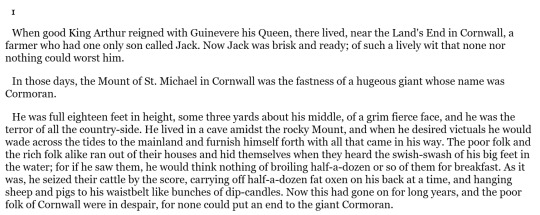
For the first three sections of the story, Jack goes around killing giants and making a name for himself (including a famous moment where he tricks a giant into commiting suicide).
For this post, we're skipping over to the part where King Arthur's son is introduced:

Lol. When I was reading this part, I couldn't help but imagine this Prince is actually Sir Loholt, who is sometimes Arthur's Legit son with Guinevere. It actually makes a lot of sense with Lanzelet's description of him:
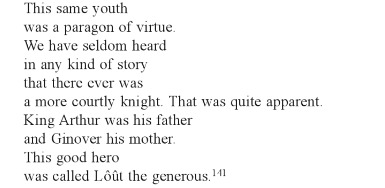
So yeah, for me he's Prince Loholt. :) Continuing on:

Yup. He's an Arthurian male character, alright. Too nice, not enough braincells.
Also, its kind of heartwarming to know Arthur and Guinevere would have a son who's so kind and generous, he wouldn't think twice to give up his riches if it meant helping someone.
So next up, Jack suggests that they sleep over at a giant's place. This is the other interesting about Jack the Giant Killer: He personally knows this giant and depending on the version, he claims this giant is actually his uncle. Other stories claim the giant is an idiot and Jack's just smooth talking him, but I think its way more interesting if the Giant IS Jack's relative. In Early Arthurian Lore, a number of giant-slayers, including Arthur, Kay and Gawain, all have giantish attributes (Kay's famous superpowers), have giants for relatives (Guinevere, in Welsh myth, is the daughter of Gogfran the giant) or are giants themselves.
Prince: Oh, so that means you're a giant, too? Jack: I guess? Prince: Cool. My Mother, the Queen, is a giantess as well. We're kinsmen! Jack: ... Prince: Also, my uncle can grow really big.
So Jack goes up to the giant's castle and knocks on the door:
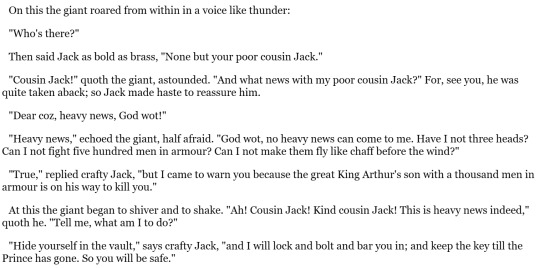
So Jack and the Prince spend the night in the giant's castle while the giant himself is locked away. The next day, the Prince continues his journey while Jack promises to catch up after he deals with the giant. What's interesting here is that this giant isn't slain like the others. He survives, unlike Jack's other foes - which kinda puts more points to my theory that this really is Jack's uncle and Jack is a half-breed giant of sorts.
The giant wants to reward Jack:

These magic items are your classic fairy tale archetypal tools that have their inspiration found in earlier myths: You have your bog-standard cuts-through-anything magic sword (like Excalibur), the slippers are the "Seven-League boots" (Based on Hermes' winged sandals) and you have an item that confers invisibility (It comes in many forms: Hade's helm, Siegfried's cloak and even Arthur himself has an Invisibility cloak too)
Jack getting these items is a way to give your hero superpowers without utilizing... unsavory methods. That he's able to use these items despite belonging to - and presumably used by - a giant is never questioned.
Moving on, we get to meet the "Possessed Lady" Loholt the Prince was after this whole time:

Well that was rude. So naturally, the Prince despairs until Jack does something about it:

Methinks that this lady is actually a murderous sorceress and isn't actually possessed.

This is romcom material.
Lady: Um, what is wrong with him? Jack: *Puts on his Cap* ...Camelot, apparently...
So once again, its up to Jack to save the day.

Are you sure this Lady is possessed? Also, she's scolding Satan - definitely wife material Queen material.

And so, Satan was killed (lol), the Lady was restored to her former good looks (even though she was already described as beautiful), she and the Prince get married and Jack gets to be one of the Knights of the Round Table.
And that's the end of this section of Jack the Giant Killer's story and end of this post. Jack's story goes on for a few more episodes of giant-slaying before ending on your typical "...and they lived happily ever. The End."
I wonder what the usual cast's (Arthur, Guinevere, Merlin, Lancelot, Gawain, etc.) reaction to this story would be.
It's notable that (at least in the version I'm reading) this section with "King Arthur's Son " is longer than other stories. Moreover, no giants are actually killed in it. The "uncle" giant was merely hood-winked and Jack uncharacteristically spares him. The story is mostly about helping King Arthur's son woo a demonically possessed Lady.
#jack the giant killer#fairy tales#sir loholt#king arthur#queen guinevere#arthuriana#arthurian legend#arthurian mythology#arthurian legends
24 notes
·
View notes
Text

The princes as Knights from Arthurian legends
Leon - King Arthur, brave and noble
Chevalier - Lancelot du Lac was extremely intelligent and known as the greatest fighter and swordsman of all the Knights of the Round Table
Clavis - Gawain, closest to Lancelot and because It was this rift between Lancelot and Gawain that ultimately set the stage for Mordred’s (Gilbert's) takeover of the Kingdom.
Note: at first I thought knight Meliagraunce would make a hilariously good Clavis because, oh boy, he 1. kidnapped the queen betraying Arthur 2. Lancelot was forced to come on a rescue facing an ambush and sacrificing his white horse to about 50 arrows 3. When they showed him mercy he challaned Lancelot to a duel in several days and then proceeded to drag Lancelot for a sightseeing of his castle 4. Betrayed him AGAIN when Lancelot fell in a trap pit, because of course 6. Waited for him on the day of the duel with Arthur as a witness (Lancelot showed up which Meliagraunce didn't expect) but then I thought Meliagraunce made a better "lord Flandre"
Yves - sir Gareth (Beaumains) he comes from noble blood, but would rather be known for his actions than for his illustrious lineage. He is said to be very good looking or "the goodliest man I ever say" as Arthur Leon put it. He's mild mannered and polite no matter how harshly others treated him because of his dubious lineage. Lancelot Chevalier and Gawain Clavis looked after him in their own ways and Gareth looked up to Lancelot Chevalier a lot. He was also a kitchen page for a year.

Jin - sir Bedivere, loyal to Arthur til the end.
Nokto - Agravain mostly because "Agravain is known for this sharp tongue and at times his ungentlemanly-like conduct. In some instances, he is even portrayed as being malicious and villainous" but maybe Agravain should be Clavis or Silvio because he helped in Mordred's (Gilbert's) insidious plot? Then idk maybe Tristan would make a good Nokto substitute because of his knowledge in arts and his romance with Isolde, still not sure about this one. The only fact stopping me is Agravain is Gaheri' (Licht) brother while Tristan is not.
Licht - sir Gaheris, often acted as Gawain's voice of consciousness and in one version beheaded his own mother (but that's another story)
Luke - Percival, came from humble beginnings raised by his mother. He has a sister too. He's sometimes portrayed as simple and almost foolish but his natural prowess lead him to Arthur's court.
Sariel - Merlin, no explanation needed
Keith - sir Kay, also known by his epithet, the Tall. Also "At times, Sir Kay was unpredictable and had a cruel and violent temper (alter Keith), but he was Arthur’s (Leon's) guardian and one of his most faithful companions.
Gilbert - Mordred. Come on, even the name is evil. Set up the stage for King Arthur's downfall by planting the seed of jealous feelings in Arthur of the closeness of his best knight, Lancelot (Cheva), and the Queen.


Emma - Guinevere, the queen, fairest of them all. Was wrongly accused of treason (twice) and sentenced to burn. Many a times did Lancelot rescue her, the last time accidentally killing Gaheris(Licht) and Gareth (Yves) because they were in the crowd and whisked Guinevere(Emma) away to the castle of Joyous Gard till the Kings anger was past. Lady of the water is an alternative


#ikepri#ikemen prince#chevalier michel#jin grandet#clavis lelouch#leon dompteur#yves kloss#nokto klein#licht klein#luke randolph#sariel noir#knight au
77 notes
·
View notes
Text
Character Catalog
Sir Aaron
Aaron Gawain Fox, an unforgettable name, is the renowned archer and infamous bravery of the Nexo Knights. He takes the title of the Emerald Knight and wears the crest of a fox on both his chest and crossbow.
Family and History
Danger and thrill were engrained in Aaron’s brain the moment he was born, but he wasn’t the only one. As the seventh child to what would eventually become fifteen, it was a family tradition to introduce each new addition to a chaotic, unforgiving world. Not that it bothered any of them. The town of Grindstead was already riddled with urban legends and superstitions, so they would all learn to adapt to the lingering disorder, perhaps even join in the madness. Fear had been an emotion conquered quickly by the Fox siblings, but it came easiest to Aaron. He felt no fear. Literally. He physically couldn’t feel any fear.
Their parents’ disapproval of their reckless behavior was a common occurrence. They had hoped one of their kids would marry rich, become successful, or strive to end the nonsense of the town. Instead, each one grew up to contribute to the chaos and become the talk of the town for the week, slandering their family name with every new story told. Life in the village by the sea was already tough. Their father, Lot Fox, was a merchant. Their mother, Morgan Fox, a tired fisherman and huntress. Both struggled to keep food on the table to feed everyone in the house and relied on the older children for aid, but they seemed to make matters worse at times. The parents still fight to keep the secret that Aaron is a changeling, possibly replaced at birth. Not even he knows.
The only other person who knew was the eldest of the fifteen, Vander Fox. Vander had been a third parent to the children for a majority of his life, paying for food and helping out when neither parent was present due to work, burnout, or another pregnancy. But instead of conditioning them to order and fear of the outside world, he taught each of them how to open their hearts to chaos and be brave.
All the Fox siblings grew up despising the knights and the system, and Aaron made it his sword duty to run them out of Grindstead. They believed all the knights were good at were wearing rich armor and abusing their title to strip the town of necessary resources, a fact they knew to be true after many investigations. With every stunt, prank, and scheme, the siblings hoped to scare or infuriate the deployed knights of their town enough to convince them to leave for good. Aaron, Vander, and two other brothers named Tommy and Thomas led the charge. Their stunts were so impressive, the whole town had their undivided attention.
On one horrific day, a prank went terribly wrong when a wild giant feline stormed into Grindstead and hunted the Fox brothers. Vander desperately fought the monster to protect his family and lost his arm in the process, but instead of treating the wound or escorting them to safety, the current knight scolded Vander for carelessness and endangering the lives of his family. Angered, Aaron lashed out at the knight by brutally wounding him with his own weapon.
Word reached Morgan and Lot. After a horrid argument between them and their disgraceful children, Lot decided to send Aaron to the Knight’s Academy as punishment. Perhaps becoming a protector of the realm would not only restore honor to their family name, it would also teach the children a valuable lesson in discipline, Aaron especially. With only a night to reminisce on the good days and say goodbye, he was sent off to Knightonia for four long years of knight training.
Personality
When people talk about Aaron, the first word that comes to mind is usually “brave”. He has been known for showing no fear regardless of the dangers presented, a flaw born of his fey blood. In truth, he physically can not feel fear, but he doesn’t know that, nor does he know about the horror of his birth.
His gluttony for the next extreme record to break has made many people call him reckless and self destructive, and he wouldn’t deny it if confronted. But he is quick to refer to himself as a chill, go-with-the-flow type man who always needs something to do. Whether it’s racing in the canyons or replaying a video game, he will never sit in the same place for more than five minutes.
Despite his collected, chaos thriving personality, Aaron has an ineffable distaste for the knights and a lingering guilt for his brother’s downfall. Perhaps he chooses to be calm for his own sanity, or perhaps he’s grown to accept his punishment.
Trivia
• Aaron Fox’s name is two puns in one. The name Aaron is (supposedly) similar to the word “arrow”, for his main weapon is a crossbow. Additionally, his full name is a reference to Back to the Future. The actor for Marty McFly was named Michael J. Fox.
• Aaron’s middle name is Gawain. Vander’s is Agravain, Tommy’s is Gareth, and Thomas’s is Gaheris.
• His body shape is very slender and tall. He stands at 6’3” and weighs only 145 lbs.
• He’s double jointed and can easily perform contortionist acts if he wanted. But usually he utilizes his flexibility for parkour.
• His eyes are deemed “colorless” due to their desaturated silver color. When a bright light is shined in them, they reflect the light off them like the eyes of a deer.
• At the age of 13, he got ran over by a cart and fractured his hands and ribs. Only his right pinky was beyond repair and had to be amputated.
• Aaron’s armor is the only set that consists of lighter steel alloys and sturdy leather. The fox ear piece on his headphones are hearing modules that increase his hearing immensely, and his visor is the only one with a glass cover over the eyes to prevent wind burn and give him access to a radar and aim-locking system. Additionally, his hands come with retractable “claws” to help with climbing, high speed chases, or melee combat.
• He is ambidextrous but often forgets that and will pick a hand when asked which one he uses more often.
• He is bisexual and is referred as he/they.
• He will randomly make fox noises in replacement of worded reactions to things. The knights don’t know why, but in truth, he and his siblings used those noises as a way to communicate with each other without using words during their younger pranking days.
• Shockingly, he doesn’t like foods that are too sweet. The other knights are in disbelief that he drinks black coffee in the mornings. But he does like dark chocolate.
• Indie rock enjoyer, but he listens to just about everything and has a playlist for every music genre.
• Skilled in a crossbow but can wield other weapons. He keeps a dagger given to him by Vander on his person at all times, and he’s able to dual wield short swords and sickles.
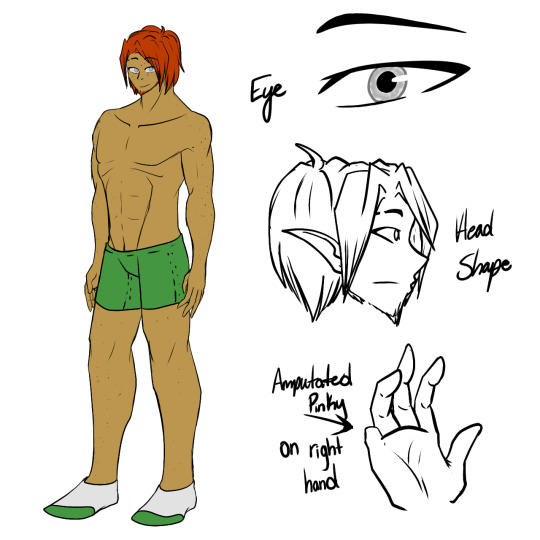
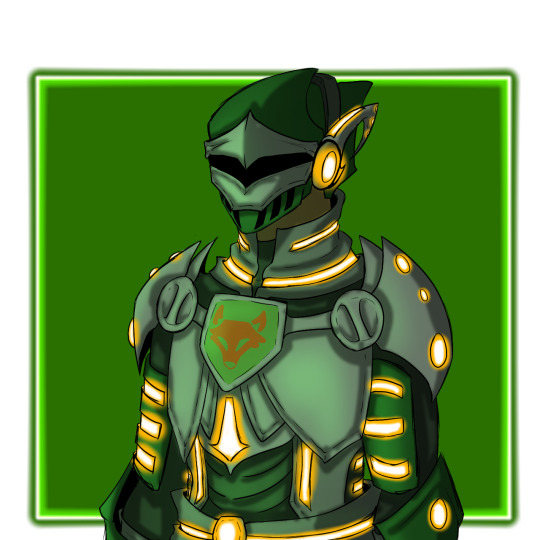
28 notes
·
View notes
Text
The Morrigán
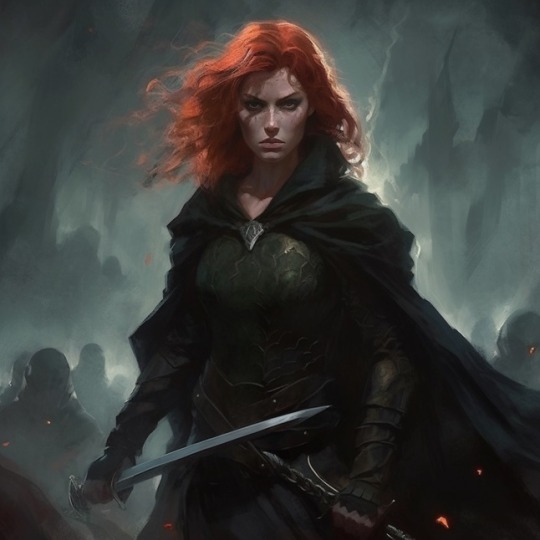
Name: The Morrigan (Great Queen, Phantom Queen,) Mor Rioghain, Morgain, Mórrígu, mór rígain, Morgan La Fay, The Bean-Nighe or The Washer At The Ford, The Wife of the Green Man, the Wyrd Sisters.
Symbols: Raven or Crow, spear.
Goddess of: Battle, prophecy, fertility, and sovereignty
Usual Image: A shapeshifter, she appears in many forms, a beautiful maiden, a mature woman, an ancient hag, a crow, a bear, and others.
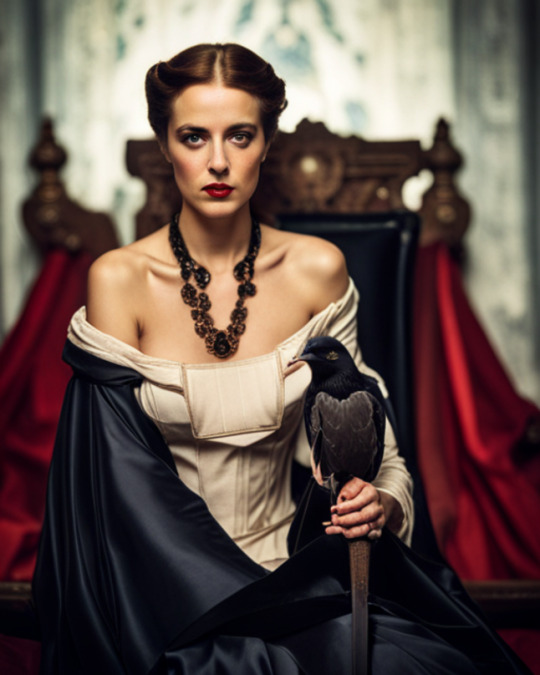
Relatives: Ernmas (mother) Cailitin, a Druid or Delbaeth or Dagda (father) Anu, Badb, Macha or Badb the Crow, Nemain the Venomous, Fea the Hateful. (Sisters or other aspects of her or goddesses she presided over.) Eriu, Fotla, and Banba (other sisters and goddesses of the land, not other aspects of her) Mechi (Son, father unknown) had three hearts, which were three serpents. The serpents, it was foretold, would destroy Ireland, so MacCecht killed him and burnt the hearts, throwing the ash into the river Berba; even then, the ash of his hearts boiled the waters of the river away and killed all the fish in the river.
Holy Books: Book of Leinster, Book of Fermoy
Synodeities: Kali (Hinduism,) Cathbodva (Gaul.)
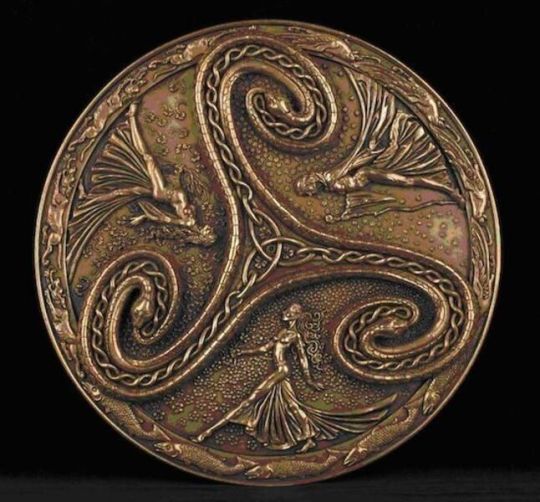
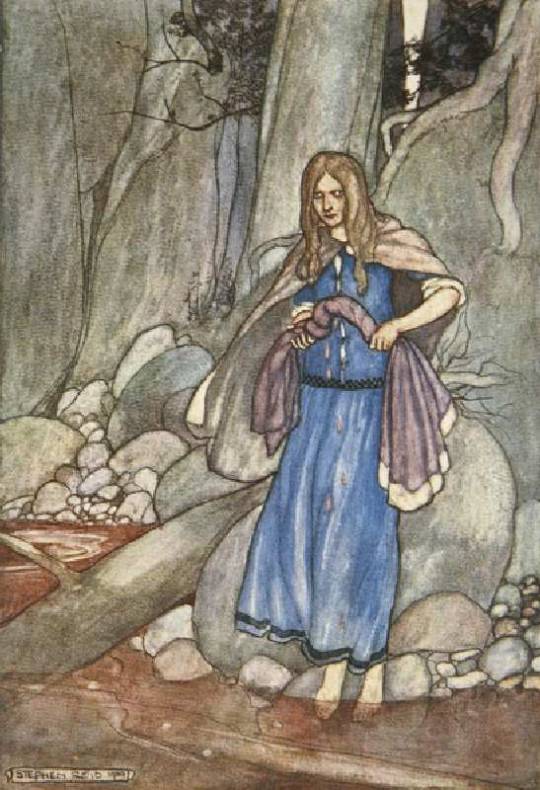
(The Watcher of the Ford, illustration from Cuchulain, The Hound of Ulster, by Eleanor Hull 1904)
Details: Once you look into the myths about the Irish goddess Morrigan you begin to understand why the Celts developed the Celtic knot!
At her most basic, Morrigan was a goddess of battle, who did not take part in the battle itself, but instead stirred up strife, then flew over the battle in the form of a crow who picked who would die by casting confusion on them, afterward feasting on their remains.
Not your warm and affectionate sort of goddess, yet she was also a goddess of fertility and sovereignty, without whom the king would be powerless.
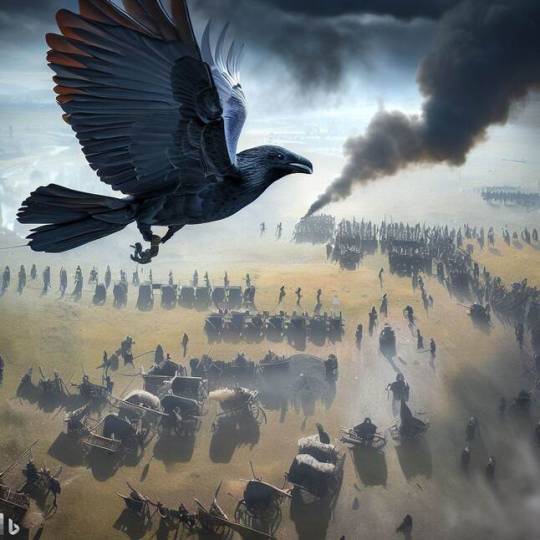
Going deeper into Morrigan (or The Morrigan as this may have at some time been a title) we find that she is also a triple goddess, who, along with either her sisters Badb and Macha or, in some accounts, Nemain the Venomous and Fea the Hateful, play a shifting role in scores of myths and legends.
What brings this goddess back in so many forms and guises, and age after age, returns in another form, even if this means mixing aspects that are both grand and horrific?
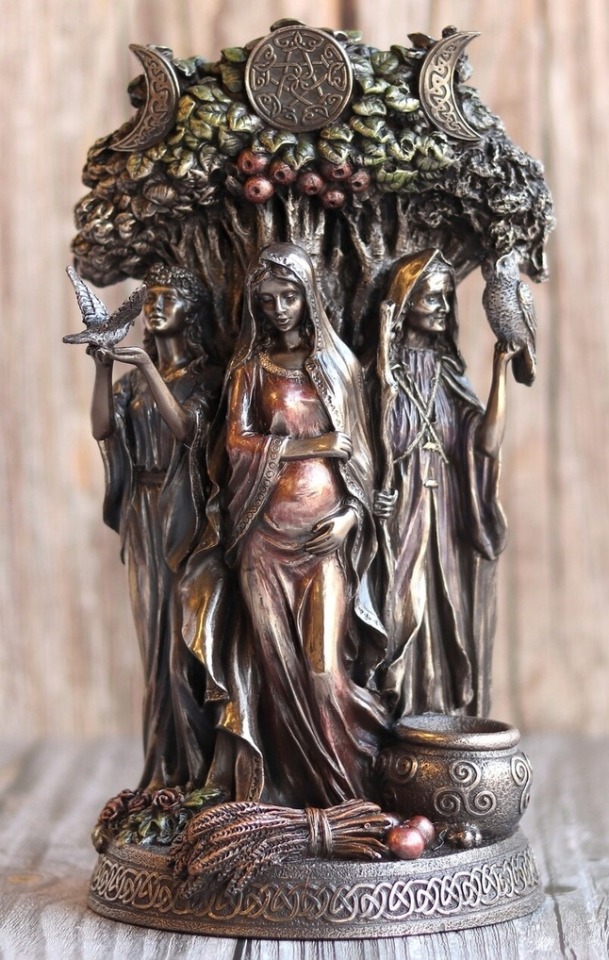
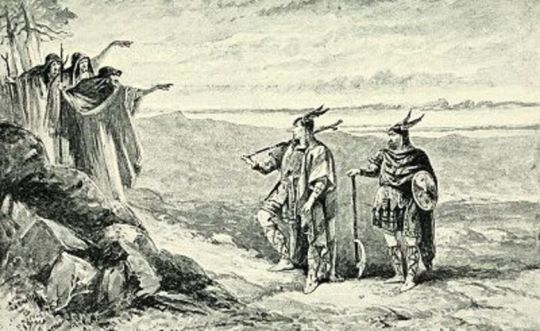
An answer might be found in the theory put forth by Ralph Abraham, mathematician, historian & Chaos theorist, in the book Chaos, Gaia, & Eros (1994, Harper Collins.)
To oversimplify it for this page, his theory is that three main forces have driven human consciousness through the ages, which he calls.
Gaia: The physical existence and living spirit of the created world.
Eros: The spiritual medium connecting Chaos & Gaia, the creative impulse and
Chaos: The creative void, the source of all forms.
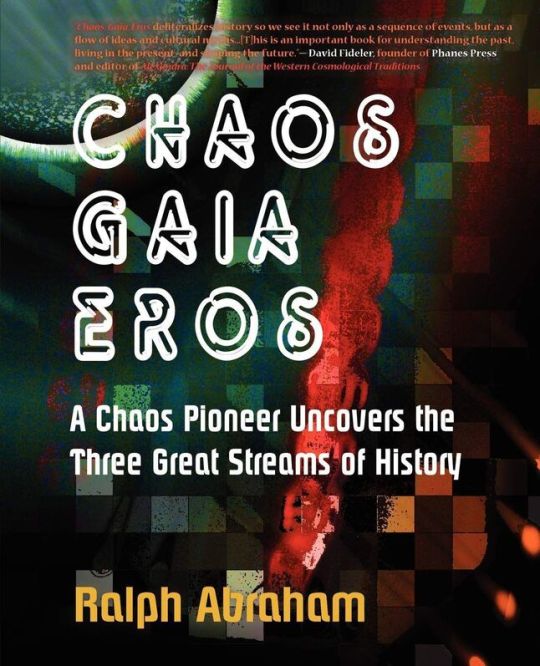
From the Paleolithic to the present, these three forces moved us forward, with at times one or more of them being suppressed only to resurface again and again.
Whoever the original goddess was who returned as the Morrigan, she was most likely first worshipped in a very different form sometime between 10,000 & 4,000 B.C.E. During what he called the Gaia span (agriculture/partnership.)
With the coming of the Eros span, 4,000 B.C.E. to +/- 1962 A.D. (the wheel, patriarchy & science), she was re-imagined by a new way of thinking that often feared Chaos and almost always had, as part of its dominant mythos, the conquest of Chaos by a hero or god representing Order.
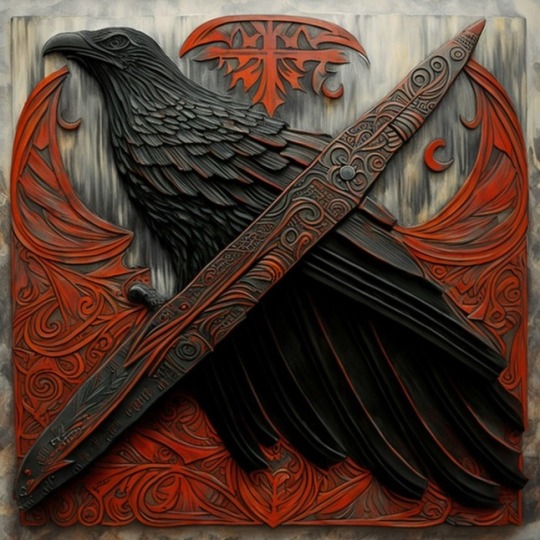
In this way, Morrigan changed from life-giver to carrion eater, and yet the three forces she is a part of continue to bring her back in multi-triad forms.
So that as the Eros span grew, she was not undone or put away but continued to shapeshift.
Changing from setting as a raven on the shoulder of dead Cú Chulainn to reappearing as Morgain La Fey in the tales of King Author, or as the wife of the Green Man and tempting Sir Gawain, to stirring the cauldron for Macbeth as the Wyrd sisters, and later as part of the Celtic Fairy faith, becoming the Bean-Nighe who is seen washing the bloody clothing of those who are about to die.
The thing is, in this theory, the Eros span has now begun to be overtaken by the now-developing Chaos span (Neo-Pagan, Post Modern, Chaos Theory, and meta-modern), which offers the hope of the end of the suppression of these three forces so they can be understood with positive effect.
No doubt the form that Morrigan takes in this era, if his theory is correct, will be most interesting indeed!

43 notes
·
View notes
Text
Plotting out "Verdant" (Disney movie)

Make sure to check out my original post here.



Background: With the recent success that Disney's had in the "Reinvention Era" (named by the fandom as a way of explaining Disney's ability to regain critical and financial success due to finding classic and original ways to make their films in the form in storytelling), the studio is a lot more open to projects pitched to them. One of them is a story inspired by "Sir Gawain and the Green Knight" (said to have been spurred on the the pitcher having seen David Lowery's 2021 adaptation of the film). Disney is intrigued by the idea, but is intimidated by the concept of adapting an Arthurian story when their "Sword in the Stone" film being an iconic film in it's own right, so it's quickly decided that the project will not take place in the same continuity as the silver age, instead simply wanting to take the bare bones from the story (as they've done with many tales before). In particular, they wanted to keep the character of the green knight and a protagonist whose morality, sense of honesty, and integrity is tested. Wanting a different angle from the film to prevent it from being generic, Disney reaches out to Tomm Moore to direct the film. After some back and forth, he eventually agrees under the condition of it being 2D (using stained glass as inspiration), and Disney reluctantly concedes to this only since they've been dabbling in 2D again and meeting success. Needless to say, the film takes on an Irish flavor as a result of his involvement. They hire Phil Johnston to write the script, and in contrast to the more polite and noble male leads of the past few films, he decides to make the protagonist more of an antihero--not with the comedic aspect of Flynn Rider or light-heartedness of Aladdin, but more serious and traumatized. To elevate the material, they decide (after some deliberation) to make the film a musical, and the Anderson-Lopez team are brought on to tackle the music.
Plot

In the land of Tíroighir, Ciarán grew up in the times of destruction. His family was slaughtered, and all he knew was rage. He turned this on the first person he encountered, but was unable to defeat him--even after beheading him. The mysterious man offers to take Ciarán under his wing and train him in order to get revenge on those who took everything from him. Ciarán accepts, and when he gets older, he feels the time is upon him to exact his revenge.
Characters
(Note: As usual, these do not represent the imagined characters in their capacity, but a brief overview of a few pivotal characters that push the narrative forward.)


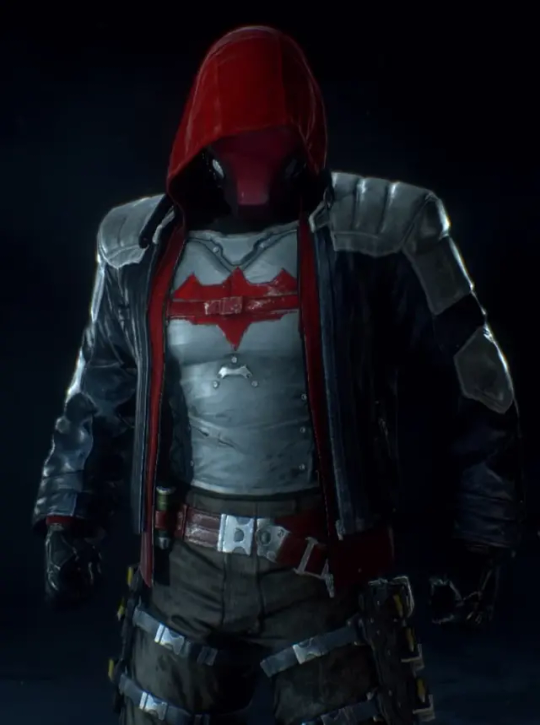
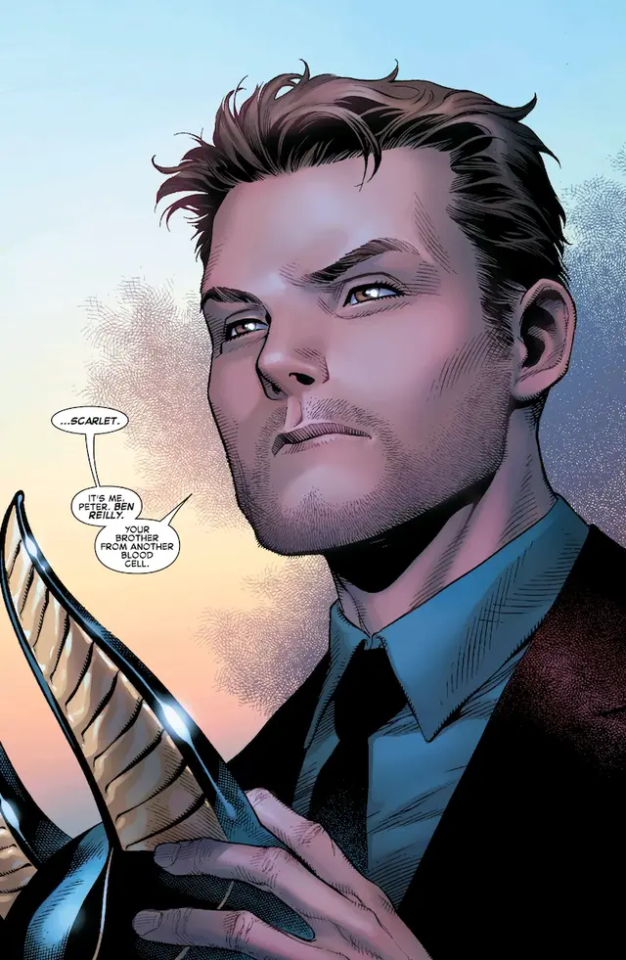
Ciarán--A young man home was devastated by followers of a demon. He only escaped because of his magical abilities; unbeknownst to him, he was a changeling (the only visual sign of this being his dark blue hair that to the untrained eye looks black). He was raised in the Emerald castle, but often travels trying to find the cult members who can lead him to the demon that took everything from him, and he'll kill them all. While he comes off as casual and confident, he's slightly unstable, emotionally-speaking (and perhaps mentally, but who can blame him?) His fight against the cult is somewhat self-destructive, with the implication that a part of him doesn't care what happens if he loses the fight.


Síomha--A warrior leading the charge against the cultists, she represents the human side to Ciarán's supernatural nature. She finds Ciarán to be a useful ally. Of course, she recognizes his dangerous nature, and they frequently come into conflict.
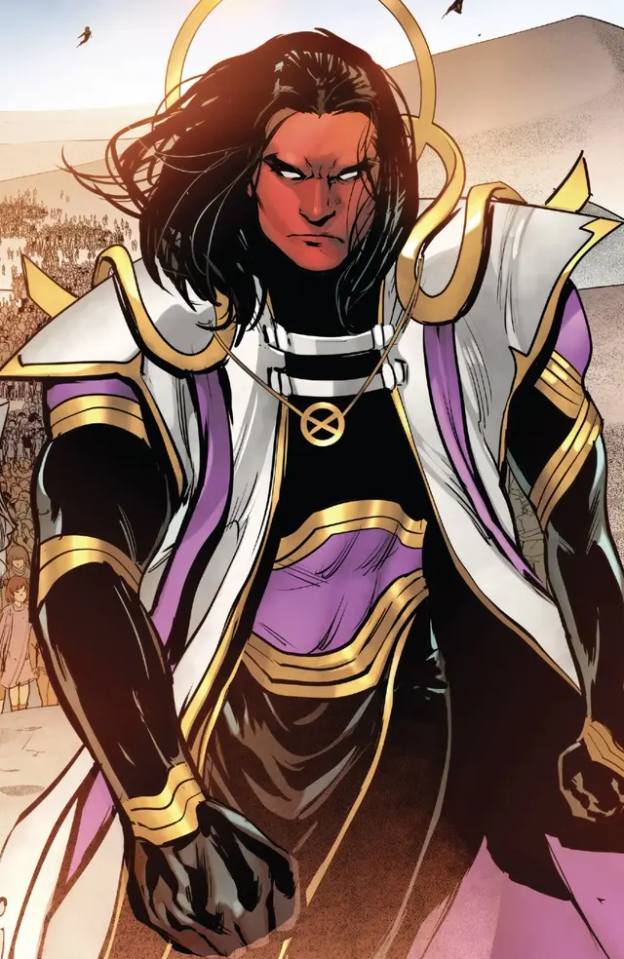

Neirin--The name the demon was given by his worshipers. He is known as the magic devourer, and his very existence causes decay and fear in all around him. Now that he's in the mortal plane, he exists only to drag the land into disorder, draining the life and magic from the land.
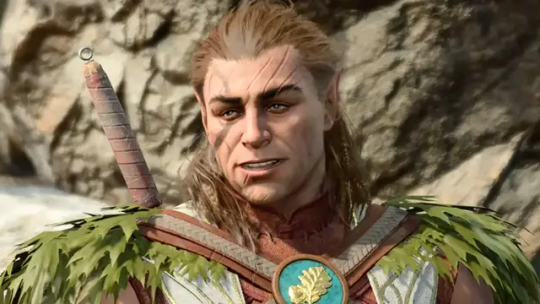

Flaithrí--Colloquially known as the harbinger of spring or the "Spring King" because everywhere he walks, flowers seem to grow (plus he's green, so there's that). No one is entirely certain where he came from. He mentioned to Ciarán that he and his sister came from a long-forgotten world, unable to speak the native language for many years. His magic is beyond anything that Ciarán can imagine, and he is seemingly immortal. While he promised to train Ciarán in the art of magic to get his revenge, he can see that in his heart, he is much more honest and gentle than he lets on. He just hopes that when it comes down to it, Ciarán won't lose himself in his trauma.
Songs
Can't Say No--When his family is murdered by the cultists, Ciarán wanders the land. He comes across Flaithrí, and in a rage, decapitates him. However, Flaithrí survives and puts a faint scar on the back of his head in response. He sees the pain in Ciarán's eyes and offers to take in the new orphan, to which Ciarán meekly accepts.
I've Never Felt It--Seeing how his desire for revenge has started to harm others, Flaithrí tries to firmly dissuade Ciarán against seeking revenge, which Ciarán is shocked and devastated to hear, explaining that he hasn't felt happy in a long time until he felt like he was making progress on his quest.
Like an Animal--Síomha gives a speech to her warriors that they must hunt down and defeat the cultists before they can summon the demon, concerned that they may already be too late.
Unsung--Ciarán has nightmares about the terrors Neirin will unleash, as well as reliving the destruction of his home. When he left Flaithrí, Ciarán was told that he might be a changeling, and he starts to dream of the realm of the fairies.
I've Never Felt It (Reprise)--Ciarán speaks with Síomha about not being able to find Flaithrí after leaving him, no longer remembering the way to the Emerald Castle. He wonders if it's his destiny to be abandoned, and Síomha wonders if there's any true way to stop Neirin.
The Demon Inside--The cult members sing about summoning Neirin, about the destruction and carnage he will bring, with the added benefit that lyrically the song also parallels Ciaran's inner turmoil.
Dreams--Ciarán has managed to defeat Neirin, and with the magic stolen by the cultists restored, he plans on finding his fairy family.
Hope you enjoyed it! As with the other specific cultures I covered in my other fanmade Disney movie posts, I don't know much about Celtic cultures, and hope Disney would do MUCH more research than me (though having and Irish director helps)! Next up is my superhero fanmade Disney musical. Still working out a title.
#disney#disney animation#the green knight#king arthur#gambit#xmen#x men#marvel#marvel comics#sasuke uchiha#naruto#jason todd#red hood#dc comics#ben reilly#spiderman#hercules#megara#exodus#muzan kibutsuji#demon slayer#kimetsu no yaiba#halsin#baldur's gate#baldur's gate 3
6 notes
·
View notes
Text
The parallels between Lelouch and Suzaku with Sir Gawain and Sir Lancelot
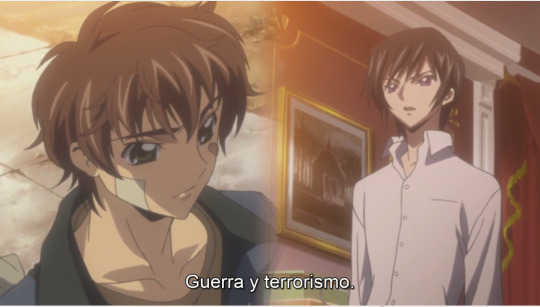
Did you know that the names of the Knightmares of the Knights of the Round and the first decent Knightmare of Lelouch are taken from Arthurian legends? Did you also know that Gawain and Lancelot were two knights from said legends who went from being friends to enemies in the same way as their namesake Knightmares pilots? And did you also know that Gawain and Lancelot have certain things in common with Lelouch and Suzaku?
Let me tell you!
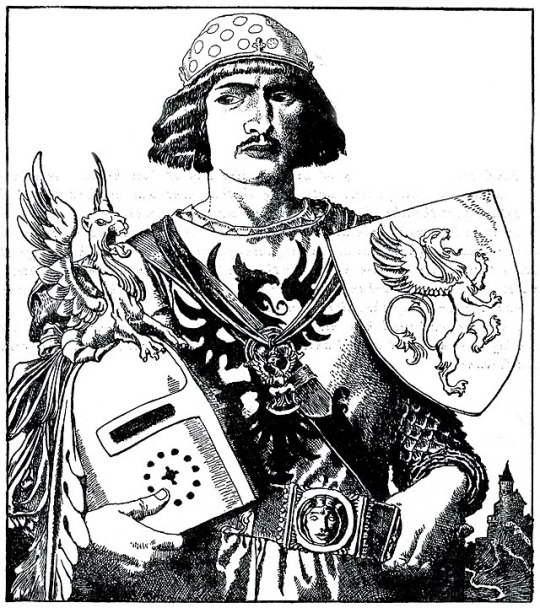
Both Lelouch and Gawain are older brothers, they are popular with women, they have a sinful and relentless nature (at least, that's how Gawain is in one of the many traditions), they are both on a path of revenge and were wronged by their best friends, Suzaku and Lancelot respectively (specifically, Gawain is referred to as Lancelot's most trusted friend).
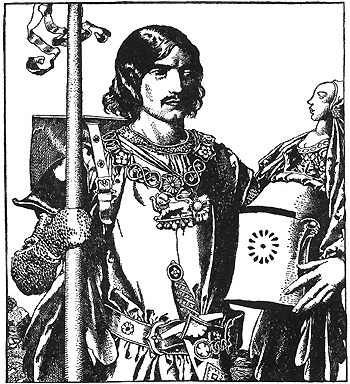
On the other hand, Suzaku and Lancelot are pacifists and virtuous. I will add that both of them, in a certain way, are traitors to their homeland, since Suzaku, being a Knight in the service of Britannia, joins Lelouch helping him to usurp the throne and giving him support and Lancelot is in love with Queen Guinevere, the wife King Arthur no more no less. Gawain and Lancelot are recognized as the greatest knights of the Round Table and likewise Lelouch and Suzaku excel in their respective fields (Lelouch is a genius and master tactician, while Suzaku is a star pilot).
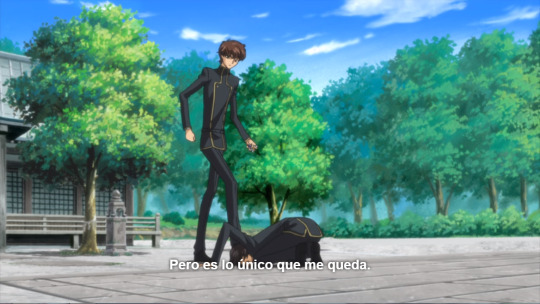
At what point does Gawain and Lancelot's friendship end and they become sworn enemies?
Well, when Lancelot kills Gawain's younger brothers, Gaharis and Gareth, while they are unarmed when they go to rescue (this was all a terrible accident; a word that isn’t foreign to the universe and fans of Code Geass). From then on, Gawain swore revenge on Lancelot and challenged him at every opportunity, though he refused to kill his dear friend.
Although Suzaku doesn’t kill Nunnally, Lelouch believed so and it wasn’t until he felt betrayed that he gave up his attempts to recruit him and finally decided to kill him. Of course, I'm referring to R2 episode 17 when Schneizel and his unit follow Suzaku to the Kururugi Temple; Lelouch thought that Suzaku betrayed him by handing him over to his brother and, therefore, in the following episode he gives Kallen the express order to destroy "the pilot of the Lancelot", so this betrayal is the product of a horrible misunderstanding (their enmity, on the other hand, was an irremediable thing since Lelouch turned Suzaku into his worst enemy and vice versa, but we will discuss that perhaps in another post).
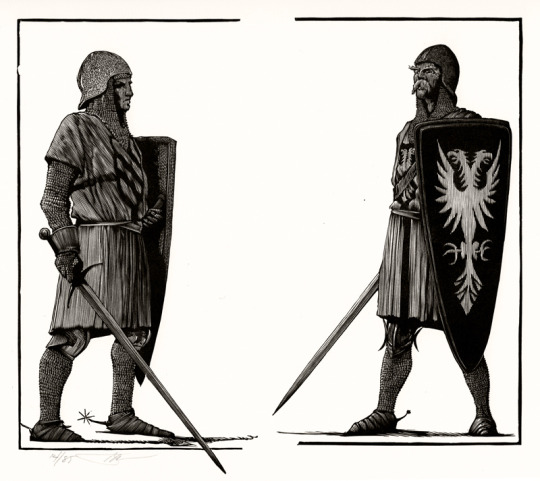
What happened to Gawain and Lancelot? In the end, Lancelot slew Gawain using a sword known as "The Red-Hilted Sword", which in appearance is similar to the sword Suzaku wielded to impale Lelouch in the Zero Requiem. Gawain spared Lancelot at his dying breath. In this sense, it is similar in what terms Suzaku and Lelouch's relationship was left since both managed to resolve their differences and the first ended up executing the second.
Keep in mind that there are as many legends of Gawain and Lancelot as there are superhero comics today. What do I want to tell you with that? That the characterizations of the characters, even the relationship between the two, vary depending on the cycle we are referring to. Gawain and Lancelot are characters that are part of the Arthurian lore and, in case you didn't know, chivalric literature was passed down orally. These characters don’t have an author (or not just one), but several minstrels who told these stories.
Hence, it seems to me that the comparison with superhero comics is the best way to illustrate them. The Batman from The Dark Knight Return is nothing like the Batman from Ego and is the same character. Just like the Gawain of Sir Gawain and the Green Knight is totally different from the Gawain that appears in "Le Morte d'Arthur", which, as I have reviewed on Wikipedia, is the work I was telling you about and it coincides with that dark stage of the character. I read Sir Gawain and the Green Knight some time ago and I seem to remember that Gawain was an example of courtesy and nobility and was firmly adherent to his vow of chastity and was thus represented for a long time, which is in stark contrast to Lancelot's lust that he was courting the king's wife (well, Suzaku did get to have an official relationship with Euphemia while Lelouch had multiple love interests, but never formalized a relationship, because he was committed to his rebellion and had no head for girls). Even so, I think I heard that the Green Knight movie, starring Dev Patel, and based on this story, Gawain has vicious attitudes and it would already correspond to that dark and bellicose version of the character (anyway, the director and the scriptwriter will have taken their creative licenses).
#lelouch#lelouch lamperouge#lelouch vi britannia#suzaku kururugi#suzaku#code geass#code geass: hangyaku no lelouch#code geass: lelouch of the rebellion#chivalric literature
50 notes
·
View notes
Note
All three! Apologies. I want to learn as much as I can about him.
You got it!
The first text that Galahad appears in is the Vulgate. His predecessors and legacy are first described in The History of the Grail; then he’s conceived, born, and raised during the Lancelot books; finally in Post-Vulgate he’s a knight on Grail Quest where he achieves his life’s purpose and passes away. Additionally, here’s A Companion to The Lancelot-Grail Cycle which may help you navigate the text.
Another book I suggest for your Galahad research is The Legend of the Grail by Nigel Bryant and Norris J. Lacy. It’s got a lengthy introduction about the history of the Grail story and touches on all the characters who’ve achieved it throughout Arthurian literary history including Perceval, Gawain, and of course, Galahad. Each chapter is taken from a different text and newly translated by Nigel Bryant for this publication. It’ll give you an idea of the progression of the Grail story which eventually led to Galahad and introduce you to some adjacent texts that may be of interest.
The next medieval text that includes Galahad is La Tavola Ritonda. It’s mostly a Prose Tristan story, but does cover the whole Grail Quest with a fun Italian Galahad named Galeazzo/Galasso. I enjoy this one a lot! Regarding Galasso specifically, it’s an interesting take on the character—he’s described as very gracious and he wields a cool named sword. Plus his purity grants him necromancy powers—at one point he convenes with the dead and doesn’t bat an eye. Just keeps on adventuring. Focused. In his lane. Pretty neat!
After that comes probably the best known Arthurian text, Le Morte d’Arthur by Sir Thomas Malory. I’ve attached the version of this story abridged by Keith Baines. It’s much easier to read with proper formatting to add quotation marks to dialogue and tighten up the prose. This one also comes with A Companion to Malory which I found exceedingly helpful in breaking down the sometimes convoluted plot threads and character dynamics present in Malory’s story. Many of the essays I’ve attached below relate to this text specifically.
Lastly I would be remiss to exclude The Arthurian Handbook by the goats Norris J. Lacy and Geoffrey Ashe. This volume not only covers medieval texts, but much of the art history that goes hand in hand with Arthurian literature too. There are many paintings, tapestries, stained glass windows, and murals featuring Galahad highlighted in this book. It also includes family trees, heraldry, and maps which can help you conceptualize things detailed in writing throughout the Vulgate.
Now I’m going to list essays without descriptions since there are so many and the titles are pretty self explanatory.
Absent Fathers, Unexpected Sons: Paternity in Malory’s Morte Darthur by Cory Rushton
Born-Again Virgins and Holy Bastards: Bors and Elyne and Lancelot and Galahad by Karen Cherwatuk
Constructing Spiritual Hierarchy through Mass Attendance in the Morte Darthur by David Eugene Clark
Disarming Lancelot by Elizabeth Scala
Galahad, Percival, and Bors: Grail Knights and the Quest for Spiritual Friendship by Richard Sévère
'A Mayde, and Last of Youre Blood': Galahad's Asexuality and its Significance in Le Morte Darthur by Megan Arkenberg
Gender and the Grail by Maureen Fries
Malory and Rape by Catherine Batt
Mothers in the Grail Quest: Desire, Pleasure, and Conception by Peggy McCracken
Seeing Is Believing and Achieving: Viewing the Eucharist in Malory's 'Sankgreal' by Sarah B. Rude
Wounded Masculinity: Injury and Gender in Sir Thomas Malory's "Le Morte Darthur" by Kenneth Hodges
And that about covers it! This should give you plenty to work with. Beyond these, we’re left with literature outside the medieval era, which is a different conversation. No doubt Alfred Lord Tennyson had a huge influence on how Galahad is perceived today, but that’s irrelevant to a discussion regarding medieval source material, and a topic for another time. Hope this helps you out and you learn all you want to about Galahad!
Take care!
#arthuriana#arthurian legend#arthurian mythology#arthurian literature#sir galahad#galahad#resource#ask#anonymous
40 notes
·
View notes
Text
GAYEST ARTHURIAN TEXT BRACKET ROUND 2:
propaganda:
Bisclavret:
- “Honestly if you don't know Bisclavret I don't know what you're doing here; it was literally taught on my university course as an example of potentail overlap between medieval studies and queer theory, it is spectacularly resonant in its themes of identity, personhood, situation of self in class and romantic-dynastic-sexual systems. The devotion of the knight to his king expressed without any of the trappings of knighthood or even a human voice. It is about yearning, it is about love, it is about love-as-loyalty, it is the literal 'let me be your hound', it is the werewolf as the outsider as the lover. When the knight awakes in the king's bed, returned to himself through love, he is greeted with rapturous joy and kisses and embraces. I really don't know what else I can say.”
- “the king…. the werewolf… I thought they were…. no, it couldn’t be….”
- “gay werewolves. need i say more???”
- “he gave him over 100 kisses <3”
- as someone who literally did my ma dissertation on werewolves i can confirm they have historically been inherently queercoded
Prose Lancelot:
- “this is the one where Galehaut gives up fighting Arthur because Lancelot bats his eyelashes at him. He spends a solid chunk of time living in chaste polyamory with Guinevere AND Lancelot. later they get separated and Galehaut dies for love because he thinks Lancelot is dead. Lancelot buries him with his own hands and tries to die by his side.This is Also the one where Gauvain says he wishes he was a woman just so he could bang Lancelot and Guinevere goes "same".”
- “GALEHAUT. Galehaut “had given [Lancelot] his heart with a love greater than loyal companionship alone could make a man feel for someone outside his family”, surrendered to Arthur for Lancelot, stepped over his own broken heart to help him be together with Guinevere, and then died of grief when he thought Lancelot had perished. Also, the remarkable bond of Lancelot and Gawain + Gawain saying he’d turn into a beautiful lady for Lancelot.”
- “Giving up on conquering the enrite kingdom because you want to be besties with Lancelot is pretty gay ngl”
- “Then Sir Gawain thought a little, like a man who believe he would never be well again. “If God were to grant me my health,” he said, “I'd immediately wish to be the most beautiful maiden in the world, happy and healthy, on condition that he would love me above all others, all his life and mine.” (Lancelot-Grail The Old French Arthurian Vulgate and Post-Vulgate in Translation, volume III, General Editor Norris J. Lacy, p.270)”
- “Going for sheer volume & variety here. Galehaut alone is worth the vote but Gawain's "I wish I was a woman so Lancelot would love me" line is just unparalleled. There's also a character named Drian the Gay rescued from a cursed coffin & as we all know, goths are queer on every axis. I rest my case.”
- “many reasons (galehauts whole thing…) but in particular remarkable reasons. that thing gawain says about wishing he was turned into a maiden on the condition that lancelot loves him for his whole life is a lot to me in particular in a multitude of queer ways”
17 notes
·
View notes
Text
Green Knight (Cavalier Archetype)

Ah yes, the Story of Sir Gawain and the Green Knight, one of the most well-known Arthurian legends, and yet, few people know that we very nearly lost this one, the original story only existing in one complete manuscript. Can you fathom how many other stories have been lost to time because of a lack of preservation efforts?
In any case, the story is so well-known that you can probably rattle off the plot relatively quickly. Sir Gawain, a knight of King Arthur’s court, encounters a mysterious green armored and skinned night who offers a game in which he will deliver the same blow to whoever strikes him in a year’s time. Foolishly Gawain goes for the neck, decapitating the Green Knight, only for him to get right back up, grab his head, and say “See you next year.” What follows is a tale detailing the inner struggle of young Gawain as he wrestles with his own mortal fear and his honor as a knight, as well as the temptations sent to lead him astray (by the Knight himself, of course. This is naturally all a trial of his devising). Finally, Gawain accepts his fate, but is greeted by surprising mercy as the Green Knight stopped his blade so as only to give Gawain a small cut on his neck.
Now, this story has been analyzed to hell and back from all sorts of angles, but today I’d like to talk about the Green Knight himself, more specifically, what is he? Certainly his allegorical nature is the topic of much discussion, but the knight himself might be an interpretation of a forest god alongside or even being a version of The Green Man, or he might even be a fey being.
The cavalier archetype that is named for this legend interprets the cavaliers in question as beings of mortal ancestry that have been blessed by fey powers, be they the Eldest, some lesser fey nobility, or even by the First World itself to have power over nature and even their own survivability, getting back up from even otherwise lethal maiming.
Regardless of their origins, these knights serve as noble guardians of nature, protecting the wilds while also upholding the honorable ideas normally seen in courts in civilization. Today we will be looking at those abilities and how they use them to great effect.
As guardians of nature, these knights have a special empathy for animal life, able to calm and befriend them the way that druids do.
They are also surprisingly tough, able to exert themselves and endure much pain without faltering.
They are, however, universally part of the Order of the Green, making them quite adept at defending nature, especially from the unnatural.
While others on death’s door would struggle to act, these warriors can not only ignore the pain and act at full capacity, but also avoid bleeding out when in such a state.
Like a druid, they also stride through natural terrain without hinderance.
Their toughness is so great that they can shrug off effects entirely that would normally at least have partial effect on their body or mind.
Green Knights even become immune to disease, infestation, and poisons, their bodies becoming impervious to such afflictions.
Among the most powerful of them find their weapons blessed to seek their target’s necks, ending most battles swiftly and surely.
The most powerful among them, however, become nearly unkillable, becoming warded against lethal necromancy and illusions, and even being able to live without their heads, fighting on even while decapitated, and able to reattach it with the help of common healing magic.
While you may give up your mount and class features associated with riding, this archetype proves tough and resilient, becoming almost paladin-like in the way they absorb incoming harmful effects and lethal damage, and boast order abilities geared towards slaying the unnatural. The utility abilities in dealing with nature are nice too. Buy yourself an ordinary non-class-feature mount and build for being a tanky and supportive combatant.
In the story, the Green Knight serves primarily to be the force that tests Gawain, the golden boy of Arthurian legend (at least until Lancelot and later Galahad supplant him in later stories), but the motives of your green knight may vary. Perhaps they have been selected by an order of druids to fight on their behalf due to their righteous and protective nature, or they may struggle to live up to the ideals that drew a fey to favor them in the first place, and so on.
Known throughout the land for her chivalry, Ser Vicen caught the eye of a fey queen, who offered her a deal, service in exchange for the forest’s protection for her kingdom. So far the deal has gone well, but recently Vicen has noticed changes, her skin taking on a greenish, plantlike pallor.
Every year, a green-armored knight has come during each festival year to test various nobles and knights in games of honor. However, the chancellor, secretly a kuwa oni, has had enough of this flagrant promotion of goodly virture in the nation that he has been trying to corrupt into debauchery for years. He seeks a no-questions-asked group to hunt down and slay the figure before he is the one picked for such a test, and found wanting.
Known now only by the name Mossmane, the centaur green knight that answers to that title is a local legend, a green-draped figure that wanders the forests in search of exploitation and evil to destroy. Those that prove their mettle might gain a bit of the elder warrior’s wisdom.
14 notes
·
View notes
Text
Round Table Newbies
Don’t worry if you don’t know a lot about King Arthur or if you haven’t read any of the stories/poems! Here are some great middle English stories to get into if you loved The Hunger Games series!
If you liked the clever survival aspects of The Hunger Games, you might also like:
Sir Gawain and the Green Knight
This story’s hero is surprisingly quite similar to Katniss Everdeen; there’s some great scenes of his survival and battles in the countryside –and of course, this is all leading up to his big final battle with his foe at the end of the story!
Sidenote: I highly recommend you read the modern English translation of this story, especially if you are new to Middle English!
If you liked the violence and rebellious nature of Catching Fire, you’ll definitely like:
The Alliterative Morte Arthure
Battles, battles, battles–there is soooo much carnage and violence in this poem that you’ll always be on the edge of your seat. While it sucks that there’s no badass female characters like Katniss or Johanna in this one, you’ll have a fun time comparing the differences in how fight scenes were written back in the late 14th century
Sidenote: try digging into some of the mysterious nature behind the poem’s unknown author!
Did you know that the Harry Potter series draws some inspiration from Arthurian Legend? Not only are Arthur and Ginny Weasley named after the king and queen of Camelot respectively, but one of the most famous wizards in history, Merlin, is name dropped a few times including the Order of Merlin status given to some witches and wizards throughout the series. However, the Wizarding World draws from King Arthur with certain story beats as well. Let’s explore a few…
Are you a fan of the battle with the troll in Sorcerer’s Stone? How about the Basilisk in Chamber of Secrets?
Consider reading the Alliterative Morte Arthure! One of the many events to occur during that story is King Arthur himself challenging a giant (which, while not the same, is quite similar to a troll). It is pretty exciting to see an actual battle between the two combatants over one well-placed levitation spell! There is also quite a bit of sword fighting within the Alliterative Morte, reflecting Harry’s fight with the Basilisk using the Sword of Gryffindor, which was likely inspired by Arthur’s own sword, Excalibur!
Enjoy the Triwizard Tournament’s Challenges within Goblet of Fire?
Look into Sir Gawain and the Green Knight! Not only does Sir Gawain face many challenges within his quest to find the Green Chapel, he must show courage and bravery, among other positive traits, to solve them. From the game he plays with the Green Knight to the trading of rewards with Lord Bertilak, Gawain is a very different character than Harry himself when it comes to solving these challenges. You can even compare and contrast the two heroes and their strengths and weaknesses!
Looking for a one-on-one fight that keeps you on your toes, similar to Harry and Voldemort in Deathly Hallows?
Try reading The Awntyrs off Arthur! The beginning might seem a bit out of place for being related to a battle-centric story such as Deathly Hallows, but the second half makes up for it with its battle between Gawain and Galeron to the near-death! While Voldemort is more pure evil than Galeron, it is still great to watch Gawain prove his value as a knight through this fight against a foe that wishes to kill him. You could even compare the women stopping the fight to save the men to Lily Potter and her saving of Harry from Voldemort’s curse!
If you liked the Maze Runner series here are some Arthurian stories that you might enjoy!
If you enjoyed the mysterious identities of the Grovers’ in Maze Runner then you’d like:
The Stanzaic Morte Arthur
The characters often liked to hide their identities throughout this poem to add a dramatic flair to thier quests much like the unknown identities of the Maze Runners. This story will keep you on your toes from start to finish with the random changing of identities that Launcelot likes to undertake.
If you enjoyed the adventures of the Grovers’ in The Scorched Trials then you’d like:
The Avowyng of Arthur
The tasks that Arthur, Kay, Gawain and Baldwin vow to perform are similar to the trials that the Grovers’ must endure. The tasks that the knights agree to undertake are meant to be life threatening and prove their knighthood is rightly deserved much like the WICKED’s goal for the kids.
Note: a dictionary of medieval words may be helpful in the reading of this poem.
#medieval literature#arthur pendragon#guenevere#king arthur#round table#gawain#the hunger games#harry potter#the maze runner#mockingjay#grovers#WICKED#ginny weasley#ron weasley#hermione granger#katniss everdeen#katniss and peeta#katniss and gale
11 notes
·
View notes
Text
The Wedding of Sir Gawain and Dame Ragnelle
This is probably the most wholesome and sweet Arthurian tale, with a very sudden tragic ending.
This poem from 15th century, translated by me into modern English, is a gender swapped a Beauty and the Beast tale, a motif that in folklore is known as the Loathly Lady.
What draws my attention to this tale is that the main moral appear to be that men should treat women well even if they appear ugly and rude, and the spell that disfigures our female protagonist is only broken when Sir Gwain gives her the possibility of choosing, essentially giving her agency of her own. It's strangely progressive for a poem from the 15th century.

Listen and pay attention to the life of a wealthy lord, there was none like him while he lived, neither in bower nor in hall.
This adventure happened during the time of King Arthur, and it was a great adventure that he himself undertook,that courteous and noble King. He surpasses all kings, Arthur being the finest, and he carries away the honor of all knighthood, wherever he went. In his country, there was nothing but chivalry, and knights were beloved by that valiant lord, for cowards were always disgraced.
Now, will you please listen for a while to my tale, I shall tell you about King Arthur,
And an incident that once occurred to him.
He was out hunting in Sherwood Forest, with all his brave and noble knights -
Now, pay attention to my story!
The King was seated at his dining table, with his bow to hunt the wild deer, and his lords were seated beside him. As the King stood, he suddenly noticed a magnificent and beautiful stag, and swiftly he moved forward.
The stag was in a thick bracken fern, and the hounds pursued, staying hidden: All who saw it marveled at the King.
"Remain silent, everyone, I will go alone, if I can, Using the craft of stalking."
The King took a bow in his hand and in a woodman's manner, he stooped low to approach that deer.
As he came near to the deer, the deer suddenly leapt into a thorny bush, and the King continued to draw nearer and nearer.
So King Arthur went for a while after the deer, I believe, about half a mile, and no one went with him. And finally, he let fly at the deer and struck it fiercely and surely - Such grace God granted him.
The deer tumbled down in response, and fell into a dense thicket of ferns; The King pursued quickly.
Suddenly, a strange man approached the King, he was well-armored and confident, a knight strong and mighty. And he spoke grim words to the King:
"Well met, King Arthur! You have wronged me for many years, and now I shall seek revenge upon you; I believe your days are near their end. You have unjustly granted my lands to Sir Gawain, with great injustice. What say you, King, all alone?"
"Sir Knight, what is your honorable name?"
"Sir King," he said, "I am Gromer Somer Joure, I tell you that with certainty."
"Oh, Sir Gromer Somer, think well; You gain no honor by killing me here. Consider that you are a knight: If you kill me now in this situation, all knights will reject you wherever you go; That shame shall never leave you. Abandon your intention and use your wit, if something is wrong, I shall rectify it,if you will it before I depart."
"Nay," said Sir Gromer Somer, "by Heaven's King! You shall not escape so easily, without lying; I have you at my mercy. If I were to let you go with mockery, you would defy me another time; I will not fail in that."
"Now," said the King, "so help me God, save my life, and whatever you most desire,
I shall grant it to you now; It would be shameful to kill me while hunting, you armed and me clad only in green, indeed."
"All this will not help you, surely, for I desire neither land nor gold, truly, unless you grant me on a certain day, as I shall set, and in the same attire."
"Yes," said the King, "Here, take my hand."
"Yes, but listen, King, and hear me for a moment. First, you shall swear upon my brown sword to reveal to me, upon your arrival, what women love best in field and town, and you shall meet me here without sending exactly on this day twelve months hence; And you shall swear upon my good sword that none of your knights shall accompany you, by the Cross, neither stranger nor friend. And if you fail to bring an answer without fail, you shall lose your head for your troubles - This shall now be your oath. What do you say, King? Let's see, have it done!"
"Sir, I agree to this! Now let me go. Though it is very disagreeable to me, I assure you, as I am a true king, I will return at the end of this twelve months and bring you your answer."
"Now go your way, King Arthur. Your life is in my hands, I am fully certain; You are not aware of your sorrow. Wait, King Arthur, just a little while: Do not deceive me today, and keep everything in secrecy - For if I knew, by the Holy Mary, that you would betray me in the field, you would first lose your life."
"Nay," said King Arthur, "that cannot be. You will never find me an untruthful knight -
I would rather die. Farewell, Sir Knight, and ill fortune. I will come, and if I am alive on the appointed day, even if I never escape."
The King blew his bugle. Every knight heard it and recognized the sound; They went towards him. There they found the King and the deer, with a somber and heavy demeanor, without any desire to play.
"Now let us return home to Carlisle; I do not enjoy this hunting well,"
So said King Arthur. All the lords knew by his expression that the King had encountered some disturbance.
Upon reaching Carlisle, the King arrived, but no one knew of his heaviness; His heart was extremely heavy. In this sadness, he remained and many of his knights wondered that time, until finally, Sir Gawain spoke to the King:
"Sire, I am greatly amazed by the thing that troubles you deeply."
Then the King answered him tightly:
"I shall tell you, noble knight Gawain. In the forest as I was today, there I encountered a knight in his armor, and he spoke certain words to me, and charged me not to reveal him; His counsel I must keep, therefore, or else I am perjured."
"Nay, do not fear, my Lord! By the blessed Virgin Mary, I am not the man who would dishonor you, neither in the evening nor in the morning."
"Indeed, I was hunting in Inglewood; You know well that I slew a deer, by the Cross,
All by myself alone. There I met a knight well-armed; He told me his name was Sir Gromer Somer Joure: Therefore, I lament my situation. That knight fiercely threatened me and intended to slay me with great heat, but I spoke kindly in return. I had no weapons with me there; Alas! My honor is now gone because of it."
"What of it?" said Gawain.
"Why more? I shall not lie: He would have slain me there without mercy - And I was reluctant to do so. He made me swear that at the end of twelve months I should meet him there in the same manner; To that, I pledged my word. And also, I should tell him on the same day what women desire most, in good faith; Otherwise, I would lose my life. I made this oath to that knight, and that I should never reveal it to anyone; I had no choice in this matter. And also, I should come in no other attire but exactly as I was on that same day. And if I fail in my answer, I know I shall be slain right there. Do not blame me though I am a sorrowful man; All this is my dread and fear."
"Yes, Sir, take heart. Let your horse be made ready to ride into a foreign land; and wherever you encounter any man or woman, indeed, ask them what they say about it, and I shall also ride another way and inquire of every man and woman, gathering what I may of their answers; And I shall write them in a book."
"I agree," said the King promptly; "It is well advised, noble Gawain, by the Holy Cross."
Soon, they were both ready, Gawain and the King, truly. The King rode one way, and Gawain another and inquired of every man, woman, and other, what women desire most dearly. Some said they loved to be well-dressed, some said they loved to be admired, some said they loved a passionate man who could embrace them and kiss them. Some said one thing, some said another; and so, Gawain had gathered many answers. By the time Gawain had obtained what he could and returned by a certain day.
Sir Gawain had gathered so many answers that he had made a great book, indeed.
He returned to the court. At that time, the King came with his book, and they both looked at each other's pamphlets.
"This cannot fail," said Gawain.
"By God," said the King, "I greatly fear; I intend to seek a little more in Inglewood Forest. I have only a month until my appointed day; I may happen upon some good tidings - That seems best to me now."
"Do as you wish," then Gawain said, "Whatever you do, I am content; It is good to be proactive. Do not doubt, Lord, you shall succeed well; Some of your answers shall help when needed, else it would be displeasing."
King Arthur rode forth on another day into Inglewood as his path lay, and there he met with a Lady. She was an incredibly unattractive creature, as no man had ever seen, beyond measure. King Arthur marveled, for sure.
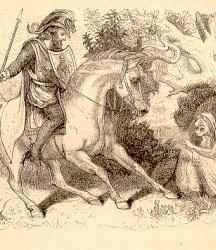
Her face was red, her nose snotty, her mouth wide, her teeth yellow and protruding, her eyes more bloated than a ball. Her mouth was nothing to admire: Her teeth hung over her lips, her cheeks as wide as women's hips. A lute she carried upon her back;
Her neck long and greatly thick; Her hair clumped in a heap; Her shoulders were a yard broad. Dangling breasts fit for a load, and she was shaped like a barrel. And to describe the foulness of that Lady, no tongue can adequately tell, truly; She had enough ugliness.
She sat on a gorgeously adorned palfrey, with gold and precious stones. It was an unseemly sight: So ugly a creature, beyond measure, to ride so finely, I assure you, It was neither reasonable nor right.
She rode up to Arthur and thus she said:
"God speed, Sir King! I am well pleased that I have met with you; Speak with me, I advise, before you go, for your life is in my hand, I warn you so; You shall find that, and I won't let it go."
"Why, what do you want with me, Lady, now?"
"Sir, I would like to speak with you and share good tidings. For all the answers you can offer, none of them shall help you at all. You shall know that, by the Cross. You think I do not know your secret, but I assure you, I know it entirely. If I do not help you, you are as good as dead. Grant me, Sir King, just one thing, and I guarantee your life's safety, or else you shall lose your head."
"What do you mean, Lady? Tell me straight, for I detest your words greatly; I have no need of you. What is your desire, fair Lady? Let me know quickly - What is your intention? And why is my life in your hand? Tell me, and I shall grant you whatever you ask."
"Indeed," said the Lady, "I am not evil. You must grant me a knight to marry: His name is Sir Gawain. And I shall make such a covenant with you that through my answer, your life shall be saved, otherwise, let my desire be in vain. And if my answer saves your life, grant me to be Gawain's wife. Consider now, Sir King. For it must be so, or you are as good as dead; Choose now, for you may soon lose your head. Tell me now, without delay."
"By Mary!" said the King, "I cannot grant you to guarantee Sir Gawain's marriage to you; It all lies in him alone. But if it is so, I will do my best to save my own life and make it secure; To Gawain, I will express my concern."
"Well," said she, "now go home again and speak fair words to Sir Gawain, for I may save your life. Though I am foul, I am still desirable; Through me, he may save your life, or else your death is certain."
"Alas!" he said, "Now woe is me that I should cause Gawain to marry you; For he will be reluctant to agree. To marry such an ugly Lady as you I have never seen in my life before; I know not what I may do."
"No matter, Sir King, though I am ugly; A mate for an owl is chosen. You shall get nothing more from me. When you return for your answer, right in this place, I shall meet you here, or else I know you are lost."
"Farewell," said the King, "Lady."
"Yes, Sir," she said, "there is a bird called an owl… And yet a Lady I am."
"What is your name, I pray you, tell me?"
"Sir King, I am called Dame Ragnelle, truly, that never yet beguiled a man."
"Dame Ragnelle, now have a good day."
"Sir King, God speed you on your way! Right here I shall meet you."
Thus they departed fair and well. The King soon came to Carlisle, and his heart heavy and great.

The first man he met was Sir Gawain, who said to the King,
"Sir, how have you fared?"
"Forsooth," said the King, "never so ill! Alas, I am on the verge of perishing, for I must be dead."
"Nay," said Gawain, "that cannot be! I would rather be dead myself, so may I thrive. These are ill tidings."
"Gawain, today I met the foulest Lady that I ever saw, certainly. She said she would save my life - But first, she would have you as her husband. Therefore, I am woeful - I lament in my heart."
"Is this all?" then said Gawain; "I shall wed her and wed her again,
Though she were a fiend; Though she were as foul as Beelzebub, I will wed her, by the Rood, or else I would not be your friend. For you are my King with honor and have honored me in many a battle; Therefore, I will not fail you. To save your life, Lord, it is my duty, even if I were false and a great coward; And my honor is the better for it."
"Indeed, Gawain, I met her in Inglewood. She told me her name, by the Rood: That it was Dame Ragnelle. She told me that unless I had an answer from her, all my efforts would be in vain - That is what she told me. And unless her answer helps me well, then let her have her desire in no measure - That was her covenant. But if her answer helps me, and no other, then she would have you: here is all together that she made a warrant."
"As for this," said Gawain, "it shall not hinder: I will wed her whenever you set it. I pray you, do not worry. For even if she were the most foul creature that men could ever see, for your love, I will not hesitate."
"Gramercy, Gawain," then said King Arthur; "Of all knights, you bear the flower that I have ever found. You have saved my honor and my life forever; Therefore, my love shall not be severed from you, as long as I am King in this land."
Then within five or six days the King must needs go on his way to deliver his answer.
The King and Sir Gawain rode out of town - No one with them, but they alone, neither far nor near.
When the King was within the forest:
"Sir Gawain, farewell, I must go west; You shall go no further."
"My Lord, God speed you on your journey. I wish I could now ride your way, for I am right woeful to part."
The King had ridden but a while, little more than the space of a mile bfore he met Dame Ragnelle.
"Ah, Sir King! You are now welcome here. I know you ride to deliver your answer; But it will avail you naught."
"Now," said the King, "since it will be no other way, tell me your answer now, and save my life; Gawain shall wed you. He has promised me to save my life, and you shall have your desire, both in chamber and in bed. Therefore, tell me now quickly - What will help me now at last? Enough, I cannot tarry."
"Sir," said Dame Ragnelle, "now you shall know what women desire most, high and low; I will not vary from this:
"Some men say we desire to be fair;
Also, we desire to have the attention
Of various strange men;
Also, we love to have pleasure in bed;
And often we desire to wed.
Thus, men do not understand
Yet, we desire another kind of thing:
To be regarded not as old, but fresh and young,
With flattery and sweet words and cunning -
So men can always win us women
By whatever they may crave.
You go about it nicely, I will not lie;
But there is one thing that is our utmost fantasy,
And now you shall know it.
We desire above all things from men
To have sovereignty, without lying,
Over all, both high and low.
For when we have sovereignty, all is ours,
Though a knight be ever so fierce,
And we always win the mastery.
Of the most manly is our desire:
To have the sovereignty of such a lord,
That is our craft and plan.
"Therefore, go, Sir King, on your way, and tell that knight, as I say, that it is as we desire most. He will be angry and unsought and curse her fast who taught it to you, for his labor is lost. Go forth, Sir King, and keep your promise, for your life is surely secured now, that I undertake with confidence."
The King rode forth in great haste, as fast as he could go through mire, moor, and fen, where the place was designated and set then.
There he met Sir Gromer, and stern words he spoke to the King:
"Come off, Sir King, now let's see your answer, what it shall be, for I am ready and prepared."
The King pulled out two books:
"Sir, here is my answer, I dare say; Some will help in need."
Sir Gromer looked at them all:
"Nay, nay, Sir King, you are as good as dead; Therefore, now you shall bleed."
"Wait, Sir Gromer," said King Arthur, "I have one answer that will make all sure."
"Let me see," then said Sir Gromer, "Or else, so help me God, as I say, you shall have your death with great pain, I assure you now."
"Now," said the King, "I see, as I guess, in you, there is but little gentleness, by God who always aids. Here is our answer, and that is all that women desire most specifically, both free and bound:
"I say no more, but above all things
Women desire sovereignty, for that is their pleasure.
And that is their utmost desire,
To have control over the manliest men,
And then they are satisfied. They informed me
To rule you, Sir Gromer."
"And she who told you, Sir Arthur, I pray to God, I may see her burn in a fire; For she was my sister, Dame Ragnelle, that old scot, God give her shame. Otherwise, I would have made you completely obedient; Now I have lost much effort. Go where you will, King Arthur, for you can be assured of me. Alas, that I ever see this day! Now I know well, you will be my enemy. And at such a distance I will never get you; My song may be 'Alas!'"
"No," said the King, "I make a vow: I will have some armor to defend myself,
That I swear to God! You will never find me in such a plight; And if you do, let me be beaten and bound, as is the best proof for you."
"Now, have a good day," said Sir Gromer.
"Farewell," said Sir Arthur, "so may I be helped, I am glad I have succeeded."
King Arthur turned his horse into the plain, and soon he met Dame Ragnelle again, in the same place and spot.
"Sir King, I am glad you have succeeded well. I told you how it would be, every bit;
Now hold what you have promised: Since I have saved your life, and no one else, Gawain must wed me, Sir Arthur, he is a very noble knight."
"No, Lady, I will not fail you what I promised. If you will be guided by my counsel, you shall have your desire."
"No, Sir King, now I will not do so; Openly I will be wedded, or I will part from you, or else, you will be shamed. Consider how I have saved your life. Therefore, do not argue with me now, for if you do, you are to blame."
The King felt great shame because of her, but she rode forth, although he was displeased; Until they arrived at Carlisle, they continued on.
She rode past him into the court; She spared no man, boldly - It greatly displeased the King.
The entire country was greatly astonished from where she came, that foul and unsweet creature;
They had never seen anything so foul.
She entered the hall, indeed.
"Arthur, King, fetch me Sir Gawain, before the knights, quickly - So that I may now be made secure. In good times and bad, bind us together, before all your chivalry. This is your promise; let's see it, be done. Send for Sir Gawain, my love, immediately, for I won't wait any longer."
Then Sir Gawain, the knight, came forward:
"Sir, I am ready for what I have promised you, to fulfill all agreements."
"God have mercy!" said Dame Ragnelle then; "I wish I were a beautiful woman for your sake, for you have such goodwill."

Then Sir Gawain pledged his loyalty to her in good times and bad, as a true knight; Then Dame Ragnelle was joyful.
"Alas!" then said Dame Gaynor; So said all the ladies in her chamber, and wept for Sir Gawain.
"Alas!" said both the King and knight, that he should wed such a creature, she was so foul and horrible. She had two tusks on each side like boar's tusks, I won't hide, of considerable length. One tusk went up and the other down. A mouth wide and terribly grown, with gray hairs in abundance. Her lips lay wrinkled on her chin; Her neck, truly, could not be seen - She was hideous! She would not be wed in any other way but with a proclamation throughout the shire, in town and borough.
All the ladies of the land she commanded to come at hand to uphold that bridal ceremony. So it happened one day that the foul maiden was to be married to Sir Gawain.
The day had come, the day it was to be; The ladies pitied her greatly.
"Alas!" they all exclaimed.
The Queen pleaded with Dame Ragnelle, indeed -
"To be married in the early morning, as privately as you can."
"No!" she said; "By Heaven's King, I will never do that, no matter what, no matter what you say. I will be wed openly, for with the King I made such a covenant. I leave no doubt for you, I will not go to church until High Mass time and I will dine in the open hall, in the midst of the crowd."
"I agree," said Dame Gaynor; "But it would seem more honorable to me and most befitting your worship."
"Yes, as for that, Lady, God save you. Today I will have my honor, I tell you without boasting."
She prepared to go to church and all the nobles who were there, Sir, without lying.
She was adorned in the richest manner, more splendid than Dame Gaynor; her attire was worth three thousand marks of fine red gold coins, stiff and strong, so richly she was adorned.
Despite her clothing, she stood out as the foulest creature that anyone had seen - No one had ever seen such a hideous sow. To make a long story short, when she was married, they went home quickly;
They all went to the feast. This foul Lady took the high seat; She was very ugly and not courteous, so they all said. When the food was served before her, she ate as much as six people combined; Many a man marveled at that. Her nails were three inches long, with them she broke her food rudely; That's why she ate alone.
She ate three capons and also three curlews, and she devoured large baked dishes, indeed. Everyone marveled at it. No food came before her that she didn't eat, more or less, that pretty, foul damsel.
All the men who saw her said the devil should gnaw her bones, both knight and squire.
So she ate until the food was finished, until they removed the tablecloths and washed, as is the custom and manner.
Many men spoke of various dishes; I believe you can guess there were plenty, both tame and wild. In King Arthur's court, there was no shortage of delicacies that could be obtained by man's hand, neither in forest nor in field. There were minstrels from different countries.
[The manuscript is missing one leaf at this point, containing about seventy lines; the narrative continues at the moment of Ragnelle's and Gawain's wedding night.]
"Ah, Sir Gawain, since I have wed you, show me your courtesy in bed; It cannot be denied rightfully. In truth, Sir Gawain," the Lady said, and if I were fair, you would show more affection, but you pay no heed to marriage. Yet, for Arthur's sake, kiss me at least; I beg you to grant me this request. Let's see how you can perform."
Sir Gawain said, "I will do more than just a kiss, and with God as witness!"
He turned to her. He saw her as the most beautiful creature he had ever seen, without measure. She said, "What is your desire?
"Ah, Jesus!" he said; "Who are you?"
"Sir, I am your wife, certainly. Why are you so unkind?"
"Ah, Lady, I am to blame. I beg your pardon, my fair madam - It was not my intention.
You are a fair lady in my eyes, and today you were the foulest creature I have ever seen with my eyes. Well, I am glad, my Lady, to have you thus" - And he embraced her in his arms and kissed her and rejoiced greatly, securely.
"Sir," she said, "this is how you shall have me: Choose one of the two, as God is my witness, my beauty will not last - Whether you want me fair at night and as ugly in daylight to everyone's sight, or else have me fair during the day and the ugliest wife at night - You must choose one. Choose one, Sir Knight, whichever you prefer, yo save your honor."
"Alas!" said Gawain; "The choice is difficult. To choose the best, it is challenging,
No matter which choice I make: To have you fair at night and nothing more, that would grieve my heart greatly, and I would lose my honor. And if I desire to have you fair during the day, then at night I would have a simple companion. Now I would gladly choose the best: I don't know what to say in this world, but do as you wish now, my gay Lady. I put the choice in your hand: Whatever you will, I leave it in your hands. Release me when you wish, for I am bound; I entrust the choice to you. Both body and possessions, heart and every part, Are all yours to buy and sell - That I vow to God!"
"Thank you, courteous Knight," said the Lady; "May you be blessed among all earthly knights, for now I am honored. You shall have me fair both day and night and for as long as I live, fair and bright; Therefore, do not be troubled. For I was shaped by necromancy, by my stepmother, may God have mercy on her, and by enchantment; And I was supposed to be different, you see, until the best knight in England truly wedded me, and he should have given me sovereignty over his entire body and possessions, indeed. Thus, I was deformed; But you, Sir Knight, courteous Gawain, have given me sovereignty, indeed, that will never anger you, early or late. Kiss me, Sir Knight, right here and now; I pray thee, be glad and make good cheer, for I am well begun."
There they rejoiced with all their might, for it was right and natural,just the two of them alone. She thanked God and the merciful Mary for being restored from her defilement; So did Sir Gawain. He made merry in her chamber and thanked Our Savior, I tell you, for certain.
With joy and mirth they stayed till day, and then they wished to rise, that fair maiden.
"You shall not," Sir Gawain said; "We will lie and sleep till prime and then let the King call us to dine."
"I am agreed," then said the maid.
Thus it passed on till midday.
"Sirs," said the King, "let us go and see if Sir Gawain is alive. I am very afraid for Sir Gawain, now lest the devil has slain him; Now I would like to know."
"Go we now," said Arthur the King. "We will go see their awakening, and how well he has fared."
They came to the chamber, all uncertain.
"Arise," said the King to Sir Gawain; "Why do you sleep so long in bed?"
"Mary," said Gawain, "Sir King, surely, I would be glad if you would let me be,
For I am well at ease. Wait, you shall see the door undone! I think that you will say I am well gone; I am loath to rise."
Sir Gawain rose, and in his hand he took his fair Lady, and to the door he shook, and opened the door very fairly. She stood in her chemise by that fire; Her hair fell to her knees like red gold wire.
"Lo, this is my wife, as you can see! Look!" said Gawain to Arthur till - "Sir, this is my wife, Dame Ragnelle, who once saved your life."
He told the King and the Queen before them how suddenly she had transformed from her shape -
"My Lord, now with your leave" -
And what was the cause she was deformed Sir Gawain told the King all the details.
"I thank God," said the Queen; "I thought, Sir Gawain, she would have harmed you;
Therefore, in my heart I was sorely aggrieved. But the opposite is now seen!"
There was game, revelry, and play, and every man said to another, "She is a fair creature."
Then the King told them all how Dame Ragnelle had helped him in need, "Or my death would have been ordained."
Then Gawain told the King all together how she was transformed by her stepmother until a knight had helped her regain her form.
There she told the King fair and well how Gawain granted her sovereignty in every aspect, and what choice she gave to him.
"God bless him for his courtesy; He saved me from misfortune and dishonor that was full foul and grim. Therefore, courteous Knight and noble Gawain, I shall never anger you, that I promise now here. While I live, I shall be obedient; To God above, I shall bear witness, and never engage in strife with you."
"Gramercy, Lady," then said Gawain; "With you, I am fully content and I trust to find."
He said, "My love she shall have. Thereafter, she shall never need to ask for more, For she has been so kind to me."
The Queen said, and all the ladies, "She is the fairest now in this hall, I swear by Saint John! My love, Lady, you shall have forever for saving my Lord Arthur, as I am a gentlewoman."
Sir Gawain beget his Gingalyn who was a good knight of strength and kin and of the Round Table.
At every great feast that Lady should be. Of fairness, she carried away the beauty,
Wherever she walked on the ground. Gawain loved that Lady, Dame Ragnelle; In all his life, he loved none so well, I tell you without lying. As a coward, he lay beside her day and night. Never would he engage in jousting rightly; At that, Arthur the King marveled.
She prayed the King for his gentleness, "To be a good lord to Sir Gromer, indeed, for what he has done to you."
"Yes, Lady, I will do that now for your sake, for I know well he cannot make amends; He acted rudely towards me."
Now to bring this to a short conclusion, I intend to end it very soon, this tale of the gentle Lady. She lived with Sir Gawain but five years; That grieved Gawain all his life, I tell you assuredly.
In her life, she never grieved him; Therefore, no woman was dearer to him.
Thus ends my tale. She was the fairest Lady of all England, when she was alive, I understand; So said Arthur the King. Thus ends the adventure of King Arthur, who often in his days was greatly troubled, and the wedding of Gawain. Gawain was wedded often in his days; But he never loved a woman so constantly, as I have heard men say.
This adventure happened in Inglewood, as good King Arthur went hunting; Thus have I heard men tell. Now, God, as you were born in Bethlehem, never let their souls be lost in the burning fire of hell!
And, Jesus, as you were born of a virgin, help him out of the sorrow that devised this tale, and do it quickly, for he is surrounded by many jailers who keep him securely, with wrongs and cunning. Now, God, as you are the true Royal King, help him out of the danger who created this tale, for he has been in it for a long time. And in great pity, help your servant, For body and soul I yield into your hands, for he suffers greatly.
Here ends the wedding of Sir Gawain and Dame Ragnelle for the help of King Arthur.

@ariel-seagull-wings @princesssarisa @mask131
14 notes
·
View notes